
cipher
Byterover Cipher is an opensource memory layer specifically designed for coding agents. Compatible with Cursor, Codex, Claude Code, Windsurf, Cline, Claude Desktop, Gemini CLI, AWS's Kiro, VS Code, Roo Code, Trae, Amp Code and Warp through MCP. Built by https://byterover.dev/
Stars: 2924
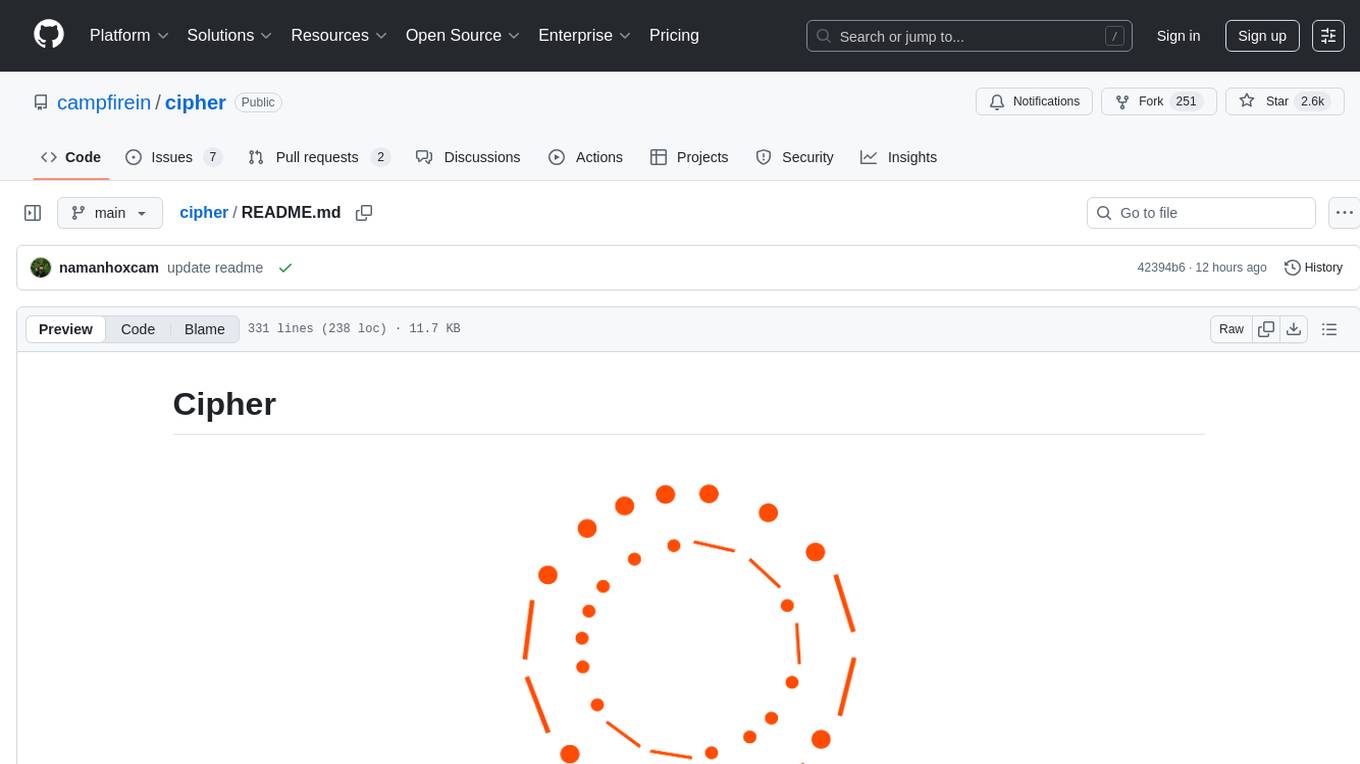
Cipher is a versatile encryption and decryption tool designed to secure sensitive information. It offers a user-friendly interface with various encryption algorithms to choose from, ensuring data confidentiality and integrity. With Cipher, users can easily encrypt text or files using strong encryption methods, making it suitable for protecting personal data, confidential documents, and communication. The tool also supports decryption of encrypted data, providing a seamless experience for users to access their secured information. Cipher is a reliable solution for individuals and organizations looking to enhance their data security measures.
README:
Byterover Cipher is an opensource memory layer specifically designed for coding agents. Compatible with Cursor, Codex, Claude Code, Windsurf, Cline, Claude Desktop, Gemini CLI, AWS's Kiro, VS Code, Roo Code, Trae, Amp Code and Warp through MCP, and coding agents, such as Kimi K2. (see more on examples)
Built by Byterover team
Key Features:
- 🔌 MCP integration with any IDE you want.
- 🧠 Auto-generate AI coding memories that scale with your codebase.
- 🔄 Switch seamlessly between IDEs without losing memory and context.
- 🤝 Easily share coding memories across your dev team in real time.
- 🧬 Dual Memory Layer that captures System 1 (Programming Concepts & Business Logic & Past Interaction) and System 2 (reasoning steps of the model when generating code).
- ⚙️ Install on your IDE with zero configuration needed.
# Install globally
npm install -g @byterover/cipher
# Or install locally in your project
npm install @byterover/cipherShow Docker Setup
# Clone and setup
git clone https://github.com/campfirein/cipher.git
cd cipher
# Configure environment
cp .env.example .env
# Edit .env with your API keys
# Start with Docker
docker-compose up --build -d
# Test
curl http://localhost:3000/health💡 Note: Docker builds automatically skip the UI build step to avoid ARM64 compatibility issues with lightningcss. The UI is not included in the Docker image by default.
To include the UI in the Docker build, use:
docker build --build-arg BUILD_UI=true .
pnpm i && pnpm run build && npm linkShow CLI commands
# Interactive mode
cipher
# One-shot command
cipher "Add this to memory as common causes of 'CORS error' in local dev with Vite + Express."
# API server mode
cipher --mode api
# MCP server mode
cipher --mode mcp
# Web UI mode
cipher --mode ui
⚠️ Note: When running MCP mode in terminal/shell, export all environment variables as Cipher won't read from.envfile.💡 Tip: CLI mode automatically continues or creates the "default" session. Use
/session new <session-name>to start a fresh session.
The Cipher Web UI provides an intuitive interface for interacting with memory-powered AI agents, featuring session management, tool integration, and real-time chat capabilities.
Cipher supports multiple configuration options for different deployment scenarios. The main configuration file is located at memAgent/cipher.yml.
Show YAML example
# LLM Configuration
llm:
provider: openai # openai, anthropic, openrouter, ollama, qwen
model: gpt-4-turbo
apiKey: $OPENAI_API_KEY
# System Prompt
systemPrompt: 'You are a helpful AI assistant with memory capabilities.'
# MCP Servers (optional)
mcpServers:
filesystem:
type: stdio
command: npx
args: ['-y', '@modelcontextprotocol/server-filesystem', '.']📖 See Configuration Guide for complete details.
Create a .env file in your project root with these essential variables:
Show .env template
# ====================
# API Keys (At least one required)
# ====================
OPENAI_API_KEY=sk-your-openai-api-key
ANTHROPIC_API_KEY=sk-ant-your-anthropic-key
GEMINI_API_KEY=your-gemini-api-key
QWEN_API_KEY=your-qwen-api-key
# ====================
# Vector Store (Optional - defaults to in-memory)
# ====================
VECTOR_STORE_TYPE=qdrant # qdrant, milvus, or in-memory
VECTOR_STORE_URL=https://your-cluster.qdrant.io
VECTOR_STORE_API_KEY=your-qdrant-api-key
# ====================
# Chat History (Optional - defaults to SQLite)
# ====================
CIPHER_PG_URL=postgresql://user:pass@localhost:5432/cipher_db
# ====================
# Workspace Memory (Optional)
# ====================
USE_WORKSPACE_MEMORY=true
WORKSPACE_VECTOR_STORE_COLLECTION=workspace_memory
# ====================
# AWS Bedrock (Optional)
# ====================
AWS_ACCESS_KEY_ID=your-aws-access-key
AWS_SECRET_ACCESS_KEY=your-aws-secret-key
AWS_DEFAULT_REGION=us-east-1
# ====================
# Advanced Options (Optional)
# ====================
# Logging and debugging
CIPHER_LOG_LEVEL=info # error, warn, info, debug, silly
REDACT_SECRETS=true
# Vector store configuration
VECTOR_STORE_DIMENSION=1536
VECTOR_STORE_DISTANCE=Cosine # Cosine, Euclidean, Dot, Manhattan
VECTOR_STORE_MAX_VECTORS=10000
# Memory search configuration
SEARCH_MEMORY_TYPE=knowledge # knowledge, reflection, both (default: knowledge)
DISABLE_REFLECTION_MEMORY=true # default: true💡 Tip: Copy
.env.exampleto.envand fill in your values:cp .env.example .env
Cipher can run as an MCP (Model Context Protocol) server, allowing integration with MCP-compatible clients like Codex, Claude Desktop, Cursor, Windsurf, and other AI coding assistants.
To install cipher for Claude Desktop automatically via Smithery:
npx -y @smithery/cli install @campfirein/cipher --client claudeTo use Cipher as an MCP server in your MCP client configuration:
{
"mcpServers": {
"cipher": {
"type": "stdio",
"command": "cipher",
"args": ["--mode", "mcp"],
"env": {
"MCP_SERVER_MODE": "aggregator",
"OPENAI_API_KEY": "your_openai_api_key",
"ANTHROPIC_API_KEY": "your_anthropic_api_key"
}
}
}
}📖 See MCP Integration Guide for complete MCP setup and advanced features.
👉 Built‑in tools overview — expand the dropdown below to scan everything at a glance. For full details, see docs/builtin-tools.md 📘.
Built-in Tools (overview)
- Memory
-
cipher_extract_and_operate_memory: Extracts knowledge and applies ADD/UPDATE/DELETE in one step -
cipher_memory_search: Semantic search over stored knowledge -
cipher_store_reasoning_memory: Store high-quality reasoning traces
-
- Reasoning (Reflection)
-
cipher_extract_reasoning_steps(internal): Extract structured reasoning steps -
cipher_evaluate_reasoning(internal): Evaluate reasoning quality and suggest improvements -
cipher_search_reasoning_patterns: Search reflection memory for patterns
-
- Workspace Memory (team)
-
cipher_workspace_search: Search team/project workspace memory -
cipher_workspace_store: Background capture of team/project signals
-
- Knowledge Graph
-
cipher_add_node,cipher_update_node,cipher_delete_node,cipher_add_edge -
cipher_search_graph,cipher_enhanced_search,cipher_get_neighbors -
cipher_extract_entities,cipher_query_graph,cipher_relationship_manager
-
- System
-
cipher_bash: Execute bash commands (one-off or persistent)
-
Watch our comprehensive tutorial on how to integrate Cipher with Claude Code through MCP for enhanced coding assistance with persistent memory:
Click the image above to watch the tutorial on YouTube.
For detailed configuration instructions, see the CLI Coding Agents guide.
| Topic | Description |
|---|---|
| Configuration | Complete configuration guide including agent setup, embeddings, and vector stores |
| LLM Providers | Detailed setup for OpenAI, Anthropic, AWS, Azure, Qwen, Ollama, LM Studio |
| Embedding Configuration | Embedding providers, fallback logic, and troubleshooting |
| Vector Stores | Qdrant, Milvus, In-Memory vector database configurations |
| Chat History | PostgreSQL, SQLite session storage and management |
| CLI Reference | Complete command-line interface documentation |
| MCP Integration | Advanced MCP server setup, aggregator mode, and IDE integrations |
| Workspace Memory | Team-aware memory system for collaborative development |
| Examples | Real-world integration examples and use cases |
For detailed documentation, visit:
We welcome contributions! Refer to our Contributing Guide for more details.
cipher is the opensource version of the agentic memory of byterover which is built and maintained by the byterover team.
- Join our Discord to share projects, ask questions, or just say hi!
- If you enjoy cipher, please give us a ⭐ on GitHub—it helps a lot!
- Follow @kevinnguyendn on X
Thanks to all these amazing people for contributing to cipher!
Elastic License 2.0. See LICENSE for full terms.
For Tasks:
Click tags to check more tools for each tasksFor Jobs:
Alternative AI tools for cipher
Similar Open Source Tools

cipher
Cipher is a versatile encryption and decryption tool designed to secure sensitive information. It offers a user-friendly interface with various encryption algorithms to choose from, ensuring data confidentiality and integrity. With Cipher, users can easily encrypt text or files using strong encryption methods, making it suitable for protecting personal data, confidential documents, and communication. The tool also supports decryption of encrypted data, providing a seamless experience for users to access their secured information. Cipher is a reliable solution for individuals and organizations looking to enhance their data security measures.
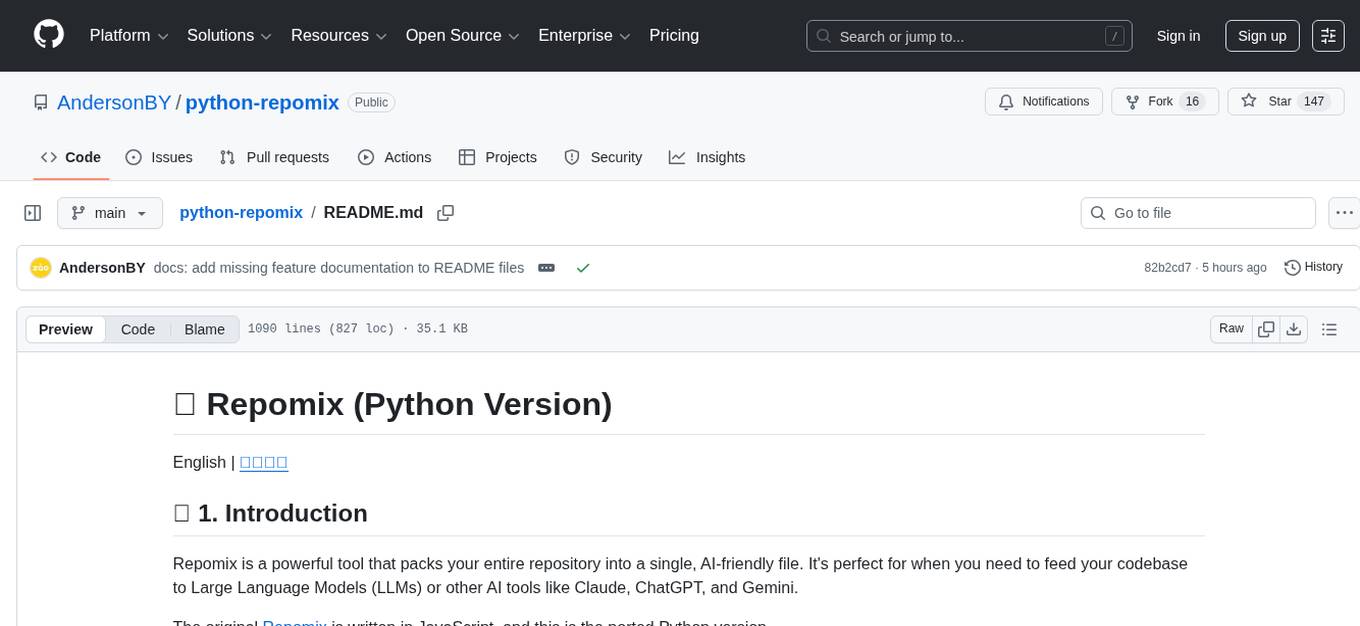
python-repomix
Repomix is a powerful tool that packs your entire repository into a single, AI-friendly file. It formats your codebase for easy AI comprehension, provides token counts, is simple to use with one command, customizable, git-aware, security-focused, and offers advanced code compression. It supports multiprocessing or threading for faster analysis, automatically handles various file encodings, and includes built-in security checks. Repomix can be used with uvx, pipx, or Docker. It offers various configuration options for output style, security checks, compression modes, ignore patterns, and remote repository processing. The tool can be used for code review, documentation generation, test case generation, code quality assessment, library overview, API documentation review, code architecture analysis, and configuration analysis. Repomix can also run as an MCP server for AI assistants like Claude, providing tools for packaging codebases, reading output files, searching within outputs, reading files from the filesystem, listing directory contents, generating Claude Agent Skills, and more.
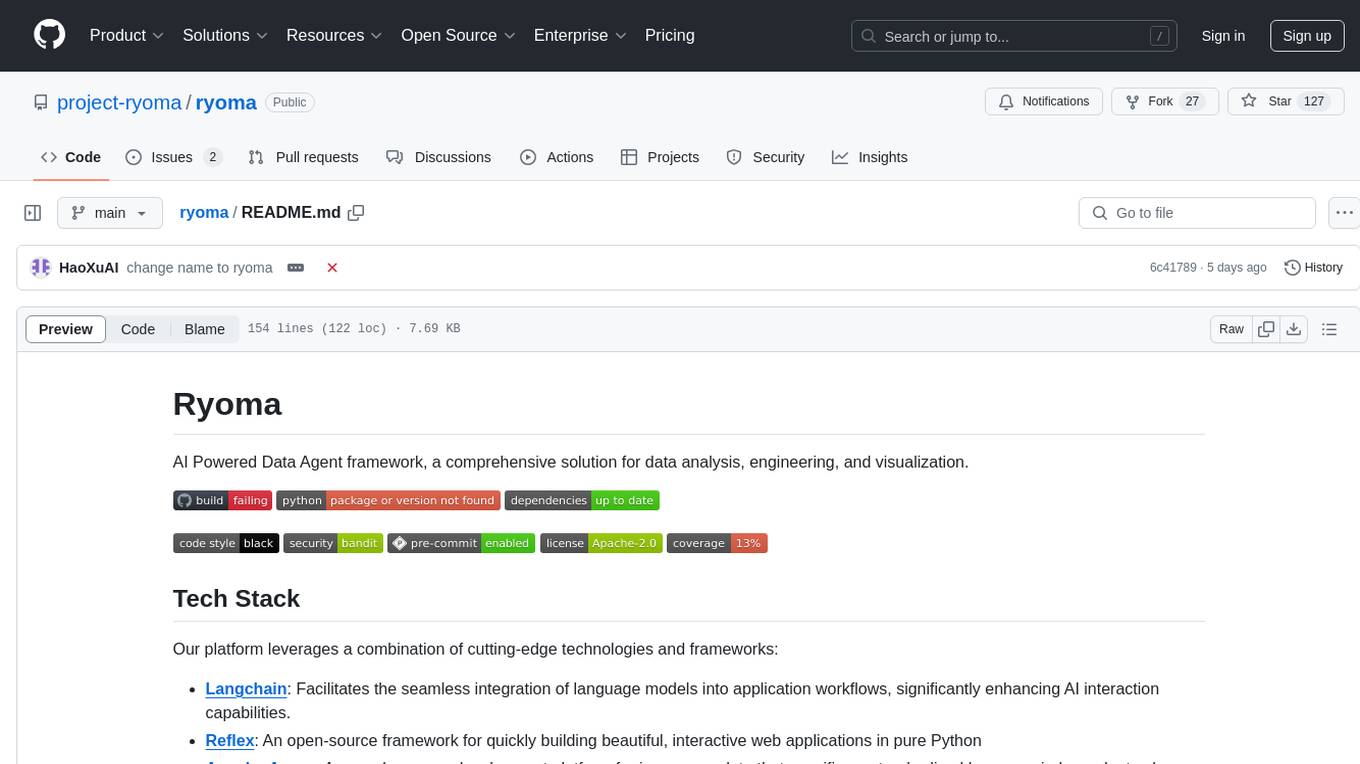
ryoma
Ryoma is an AI Powered Data Agent framework that offers a comprehensive solution for data analysis, engineering, and visualization. It leverages cutting-edge technologies like Langchain, Reflex, Apache Arrow, Jupyter Ai Magics, Amundsen, Ibis, and Feast to provide seamless integration of language models, build interactive web applications, handle in-memory data efficiently, work with AI models, and manage machine learning features in production. Ryoma also supports various data sources like Snowflake, Sqlite, BigQuery, Postgres, MySQL, and different engines like Apache Spark and Apache Flink. The tool enables users to connect to databases, run SQL queries, and interact with data and AI models through a user-friendly UI called Ryoma Lab.
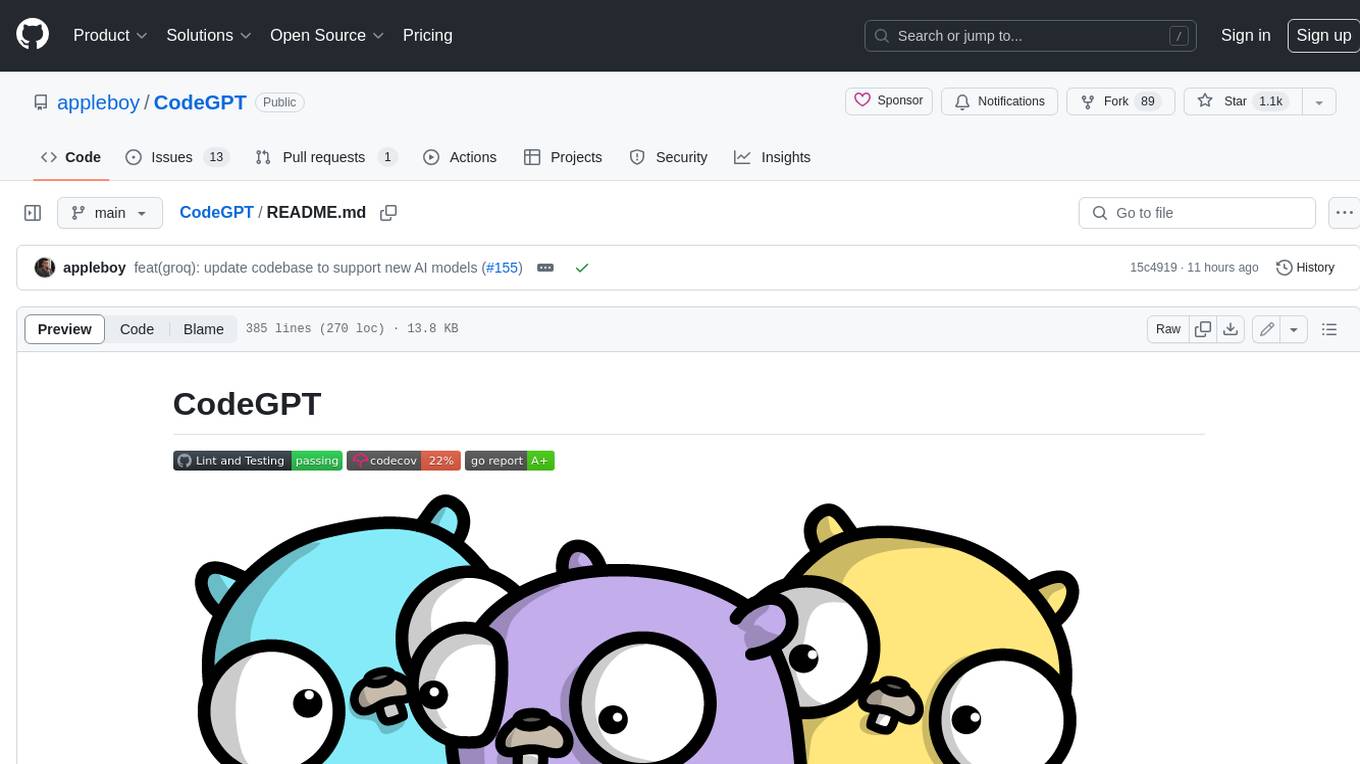
CodeGPT
CodeGPT is a CLI tool written in Go that helps you write git commit messages or do a code review brief using ChatGPT AI (gpt-3.5-turbo, gpt-4 model) and automatically installs a git prepare-commit-msg hook. It supports Azure OpenAI Service or OpenAI API, conventional commits specification, Git prepare-commit-msg Hook, customizing the number of lines of context in diffs, excluding files from the git diff command, translating commit messages into different languages, using socks or custom network HTTP proxies, specifying model lists, and doing brief code reviews.
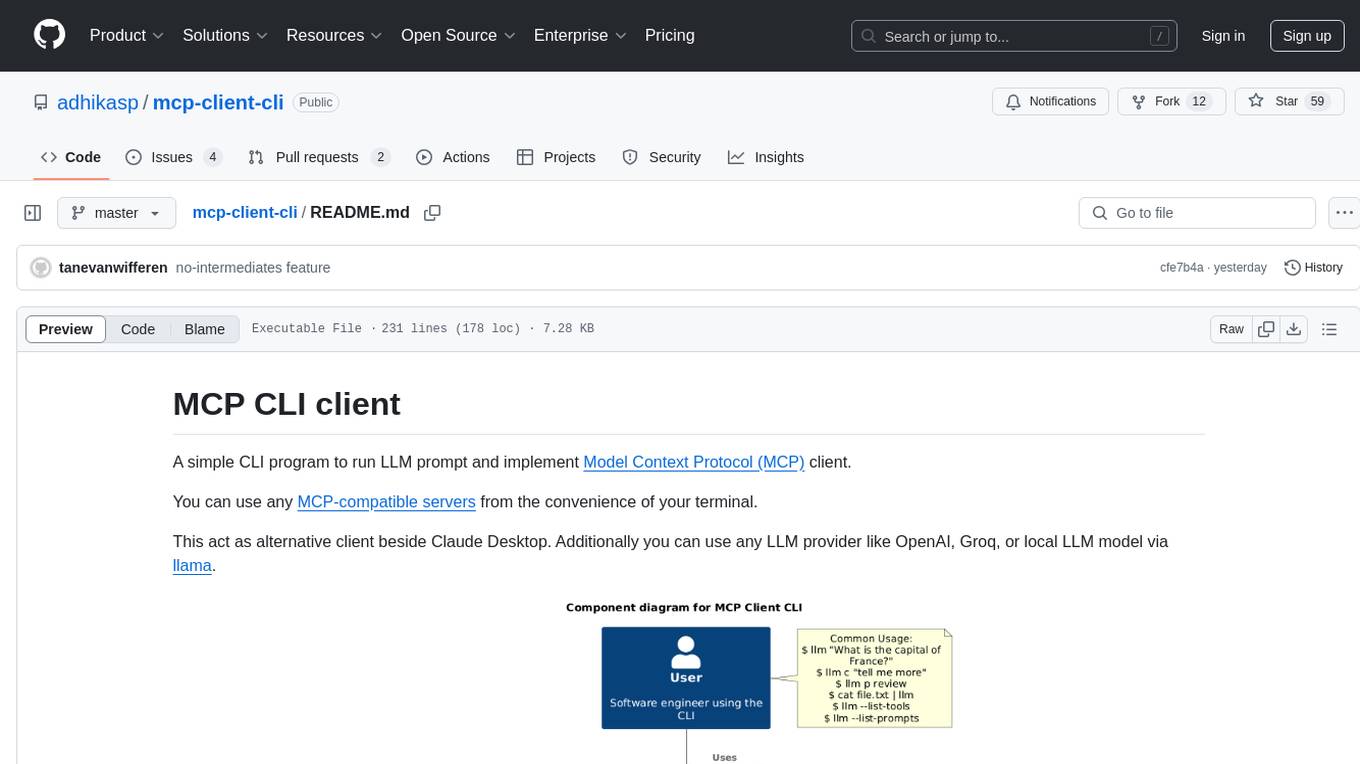
mcp-client-cli
MCP CLI client is a simple CLI program designed to run LLM prompts and act as an alternative client for Model Context Protocol (MCP). Users can interact with MCP-compatible servers from their terminal, including LLM providers like OpenAI, Groq, or local LLM models via llama. The tool supports various functionalities such as running prompt templates, analyzing image inputs, triggering tools, continuing conversations, utilizing clipboard support, and additional options like listing tools and prompts. Users can configure LLM and MCP servers via a JSON config file and contribute to the project by submitting issues and pull requests for enhancements or bug fixes.
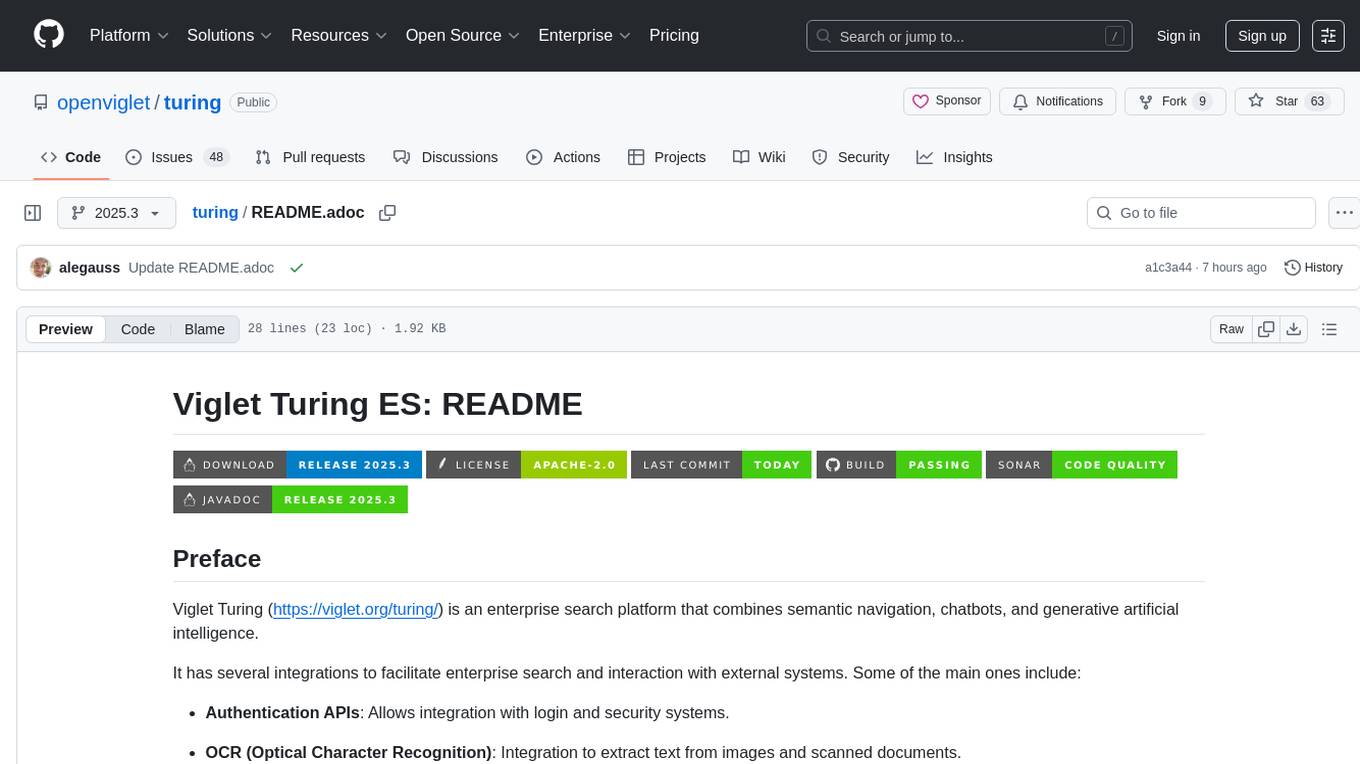
turing
Viglet Turing is an enterprise search platform that combines semantic navigation, chatbots, and generative artificial intelligence. It offers integrations for authentication APIs, OCR, content indexing, CMS connectors, web crawling, database connectors, and file system indexing.
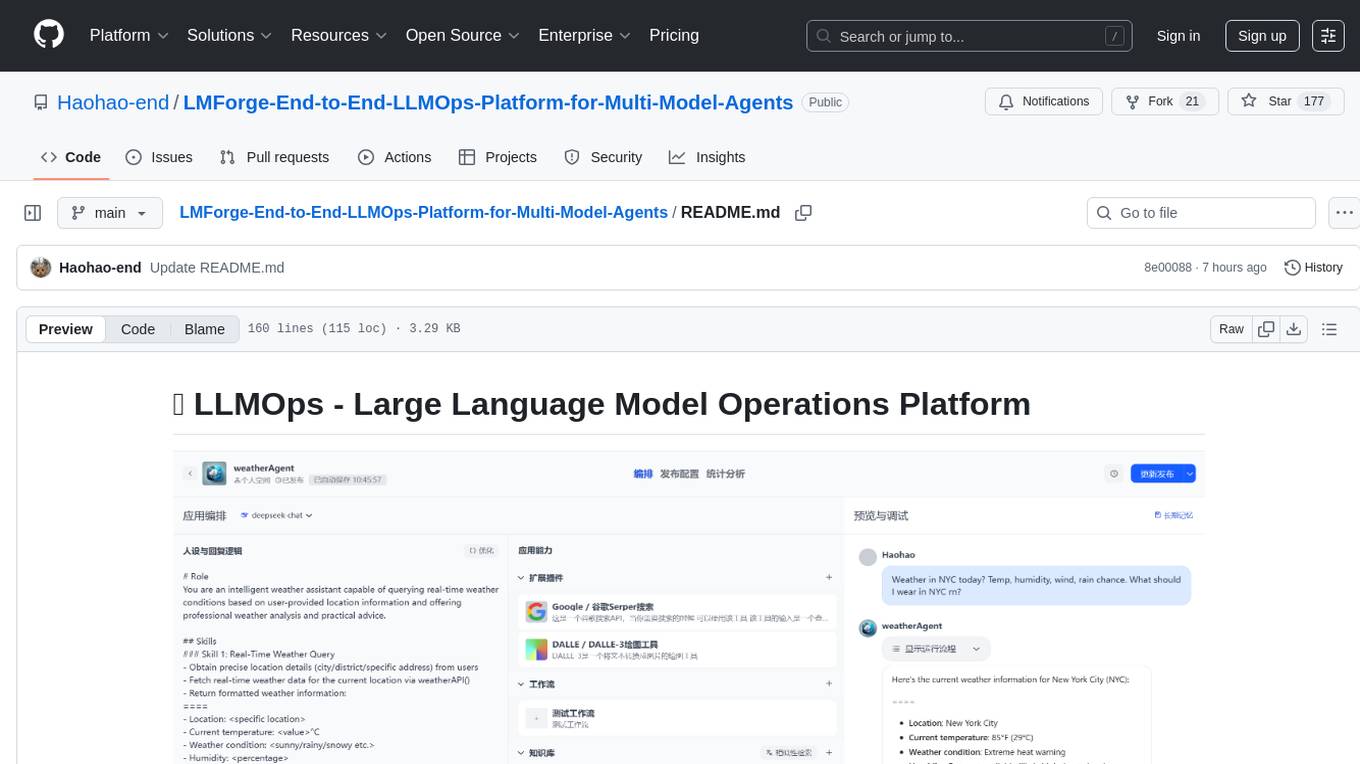
LMForge-End-to-End-LLMOps-Platform-for-Multi-Model-Agents
LMForge is an end-to-end LLMOps platform designed for multi-model agents. It provides a comprehensive solution for managing and deploying large language models efficiently. The platform offers tools for training, fine-tuning, and deploying various types of language models, enabling users to streamline the development and deployment process. With LMForge, users can easily experiment with different model architectures, optimize hyperparameters, and scale their models to meet specific requirements. The platform also includes features for monitoring model performance, managing datasets, and collaborating with team members, making it a versatile tool for researchers and developers working with language models.
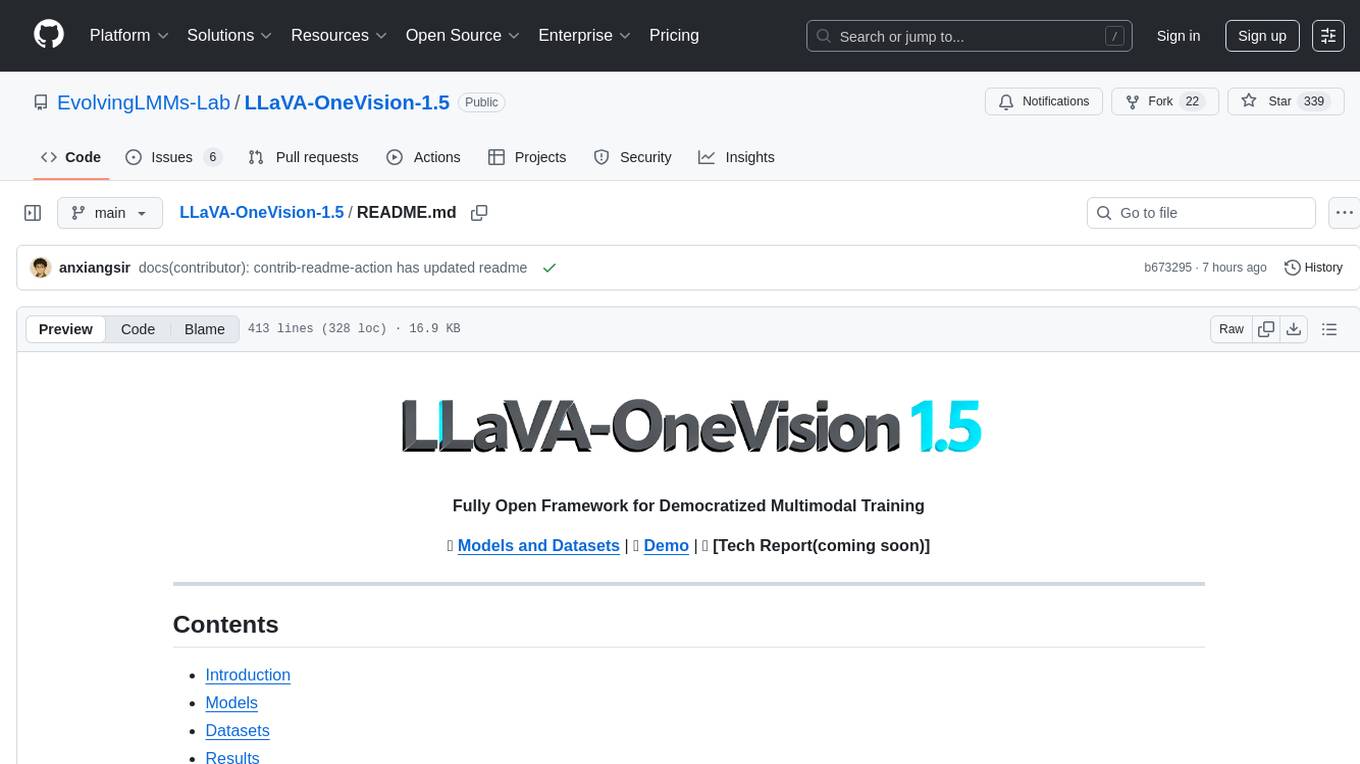
LLaVA-OneVision-1.5
LLaVA-OneVision 1.5 is a fully open framework for democratized multimodal training, introducing a novel family of large multimodal models achieving state-of-the-art performance at lower cost through training on native resolution images. It offers superior performance across multiple benchmarks, high-quality data at scale with concept-balanced and diverse caption data, and an ultra-efficient training framework with support for MoE, FP8, and long sequence parallelization. The framework is fully open for community access and reproducibility, providing high-quality pre-training & SFT data, complete training framework & code, training recipes & configurations, and comprehensive training logs & metrics.
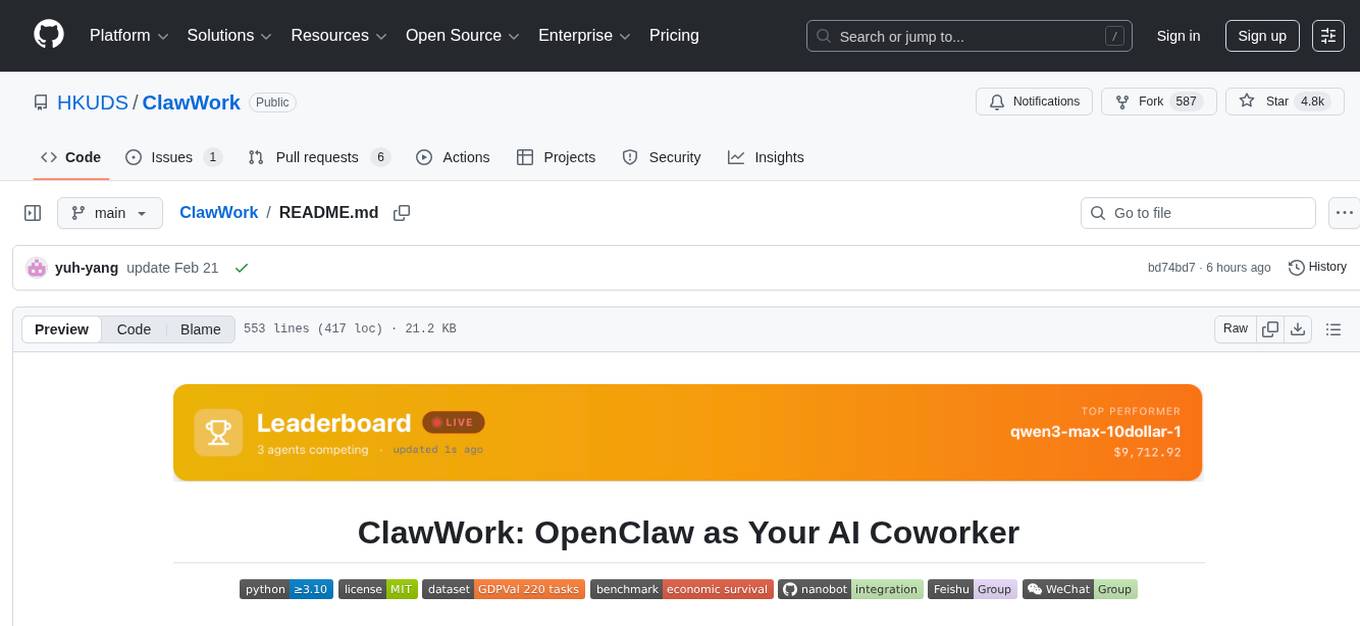
ClawWork
ClawWork is an AI coworker tool that transforms AI assistants into true coworkers capable of completing real work tasks and creating economic value. It provides a platform for agents to earn income by completing professional tasks from the GDPVal dataset, ensuring economic solvency and quality work. The tool offers features like real professional tasks, extreme economic pressure, strategic work choices, a React dashboard for visualization, lightweight architecture, end-to-end professional benchmarking, and rigorous evaluation. ClawWork integrates with Nanobot to create economically accountable coworkers, where every conversation costs tokens and income is generated through real work tasks.
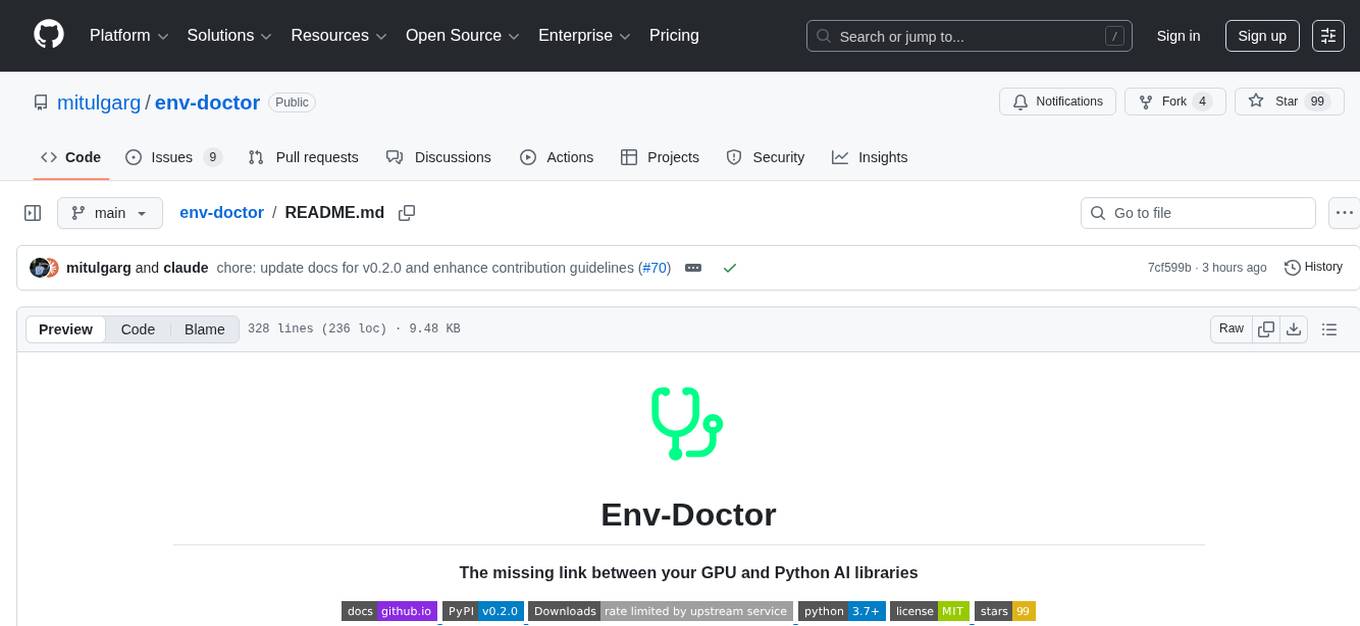
env-doctor
Env-Doctor is a tool designed to diagnose and fix mismatched CUDA versions between NVIDIA driver, system toolkit, cuDNN, and Python libraries, providing a quick solution to the common frustration in GPU computing. It offers one-command diagnosis, safe install commands, extension library support, AI model compatibility checks, WSL2 GPU support, deep CUDA analysis, container validation, MCP server integration, and CI/CD readiness. The tool helps users identify and resolve environment issues efficiently, ensuring smooth operation of AI libraries on their GPUs.
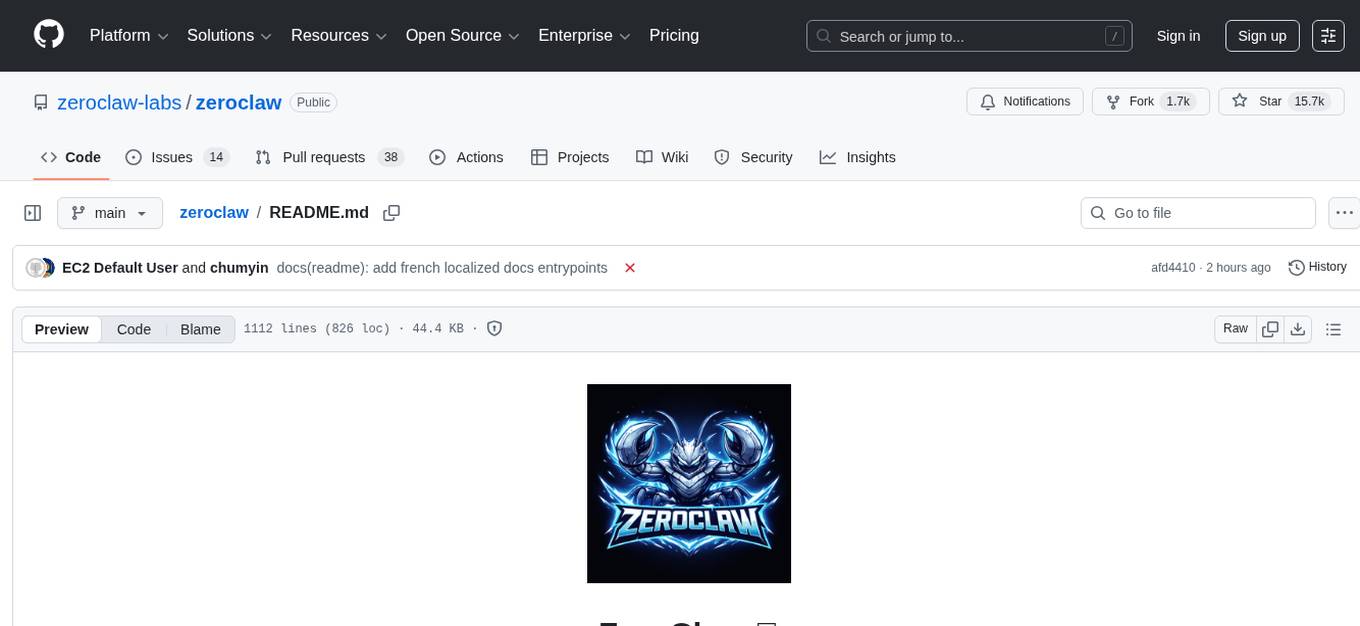
zeroclaw
ZeroClaw is a fast, small, and fully autonomous AI assistant infrastructure built with Rust. It features a lean runtime, cost-efficient deployment, fast cold starts, and a portable architecture. It is secure by design, fully swappable, and supports OpenAI-compatible provider support. The tool is designed for low-cost boards and small cloud instances, with a memory footprint of less than 5MB. It is suitable for tasks like deploying AI assistants, swapping providers/channels/tools, and pluggable everything.
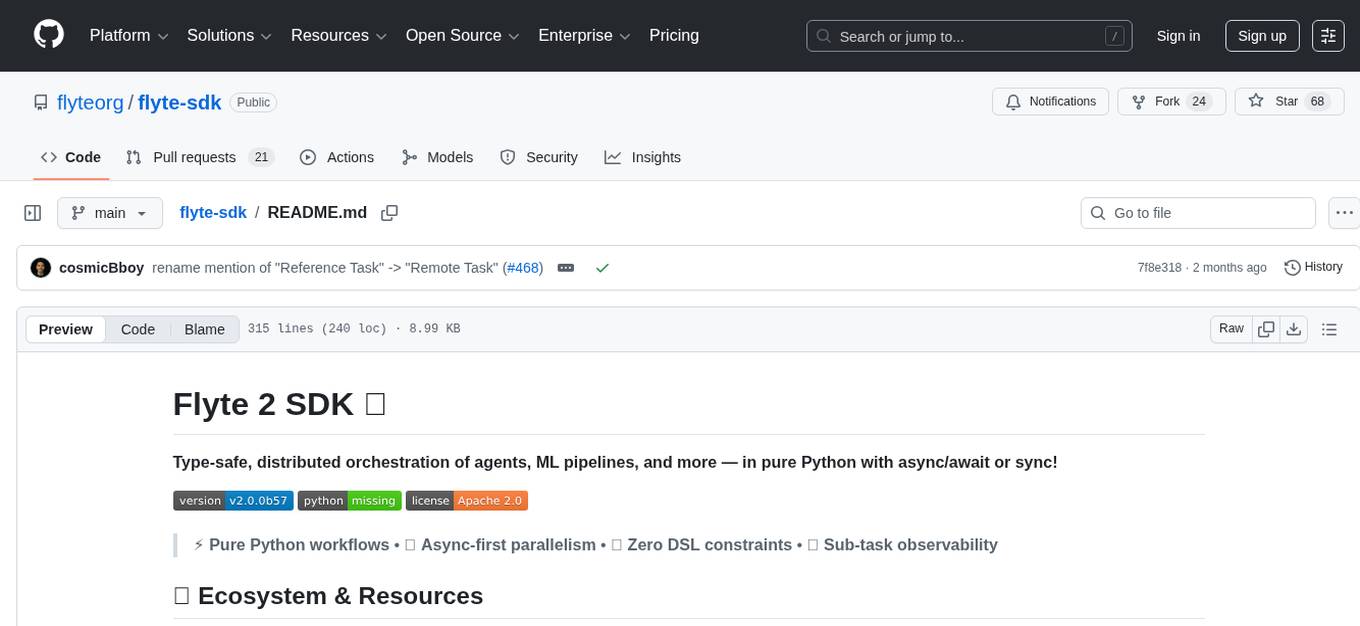
flyte-sdk
Flyte 2 SDK is a pure Python tool for type-safe, distributed orchestration of agents, ML pipelines, and more. It allows users to write data pipelines, ML training jobs, and distributed compute in Python without any DSL constraints. With features like async-first parallelism and fine-grained observability, Flyte 2 offers a seamless workflow experience. Users can leverage core concepts like TaskEnvironments for container configuration, pure Python workflows for flexibility, and async parallelism for distributed execution. Advanced features include sub-task observability with tracing and remote task execution. The tool also provides native Jupyter integration for running and monitoring workflows directly from notebooks. Configuration and deployment are made easy with configuration files and commands for deploying and running workflows. Flyte 2 is licensed under the Apache 2.0 License.
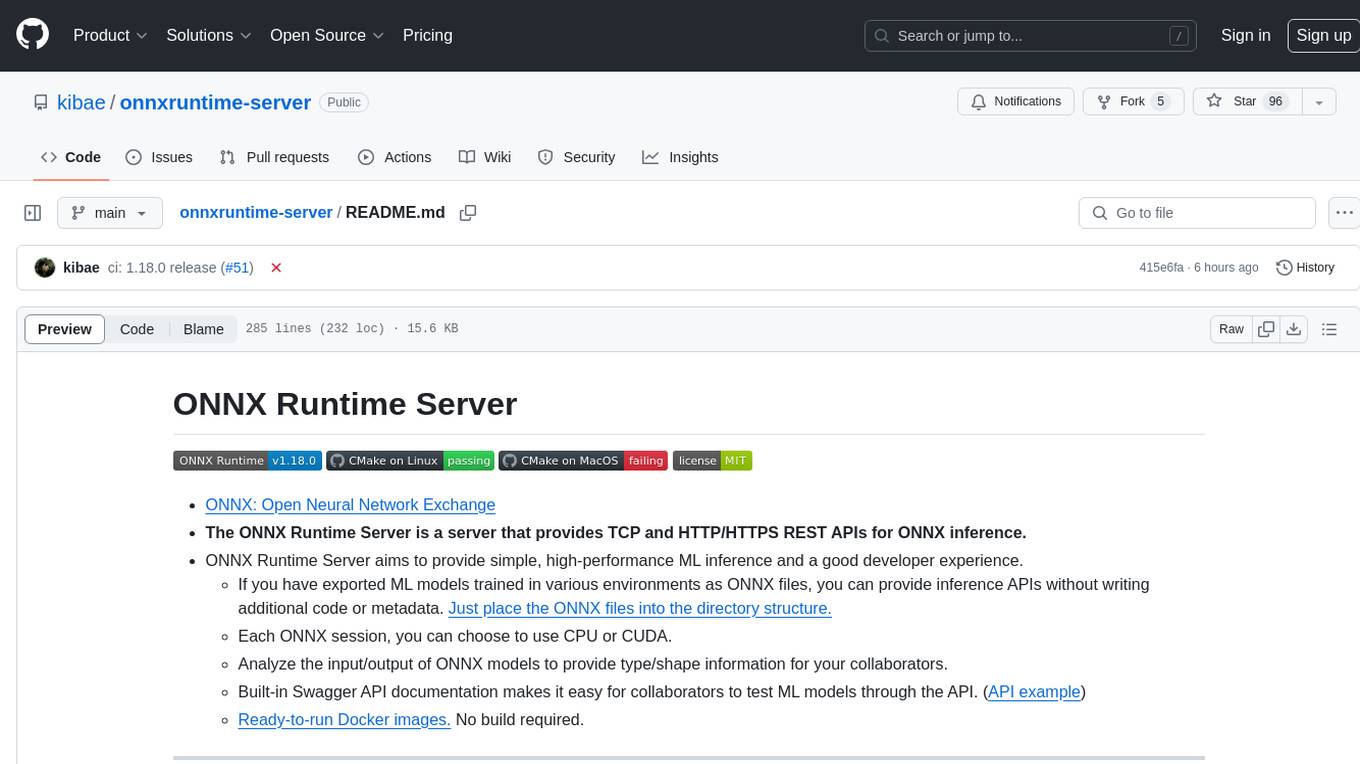
onnxruntime-server
ONNX Runtime Server is a server that provides TCP and HTTP/HTTPS REST APIs for ONNX inference. It aims to offer simple, high-performance ML inference and a good developer experience. Users can provide inference APIs for ONNX models without writing additional code by placing the models in the directory structure. Each session can choose between CPU or CUDA, analyze input/output, and provide Swagger API documentation for easy testing. Ready-to-run Docker images are available, making it convenient to deploy the server.
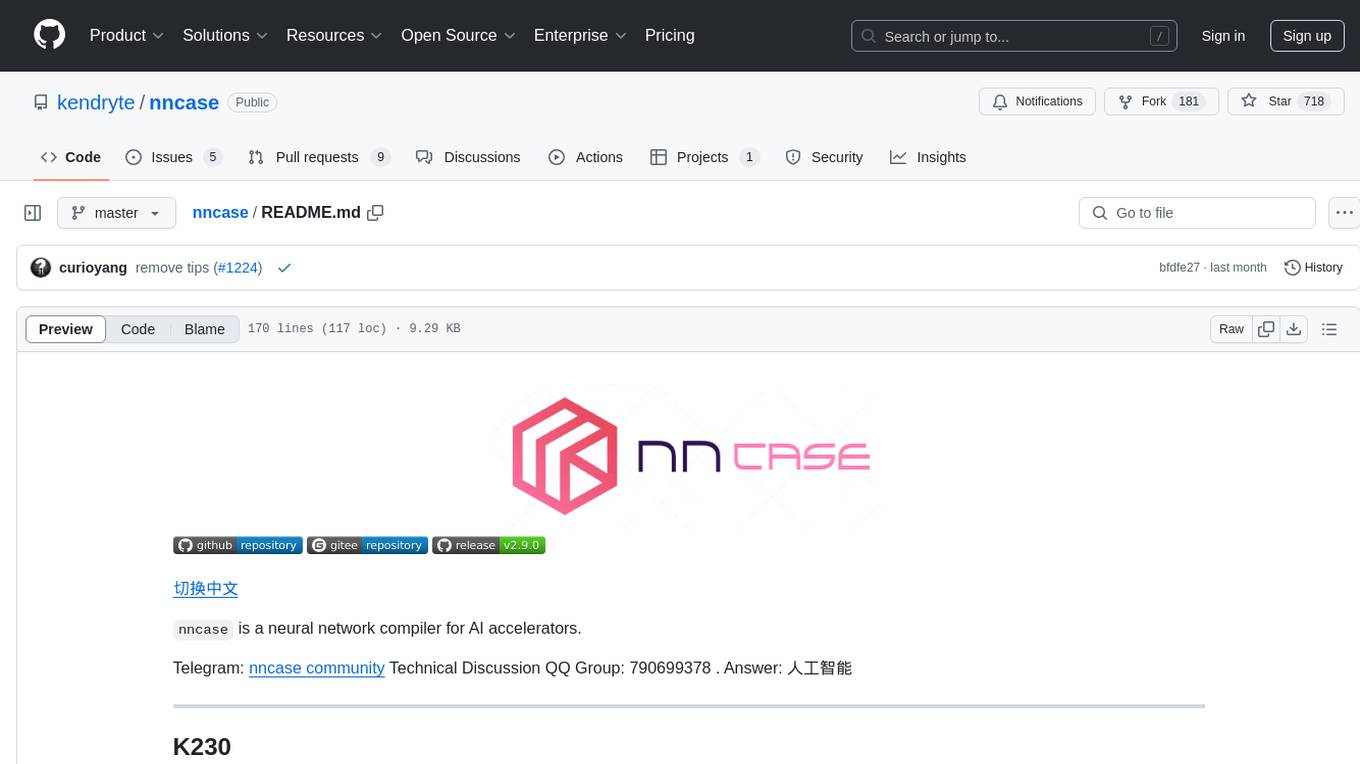
nncase
nncase is a neural network compiler for AI accelerators that supports multiple inputs and outputs, static memory allocation, operators fusion and optimizations, float and quantized uint8 inference, post quantization from float model with calibration dataset, and flat model with zero copy loading. It can be installed via pip and supports TFLite, Caffe, and ONNX ops. Users can compile nncase from source using Ninja or make. The tool is suitable for tasks like image classification, object detection, image segmentation, pose estimation, and more.
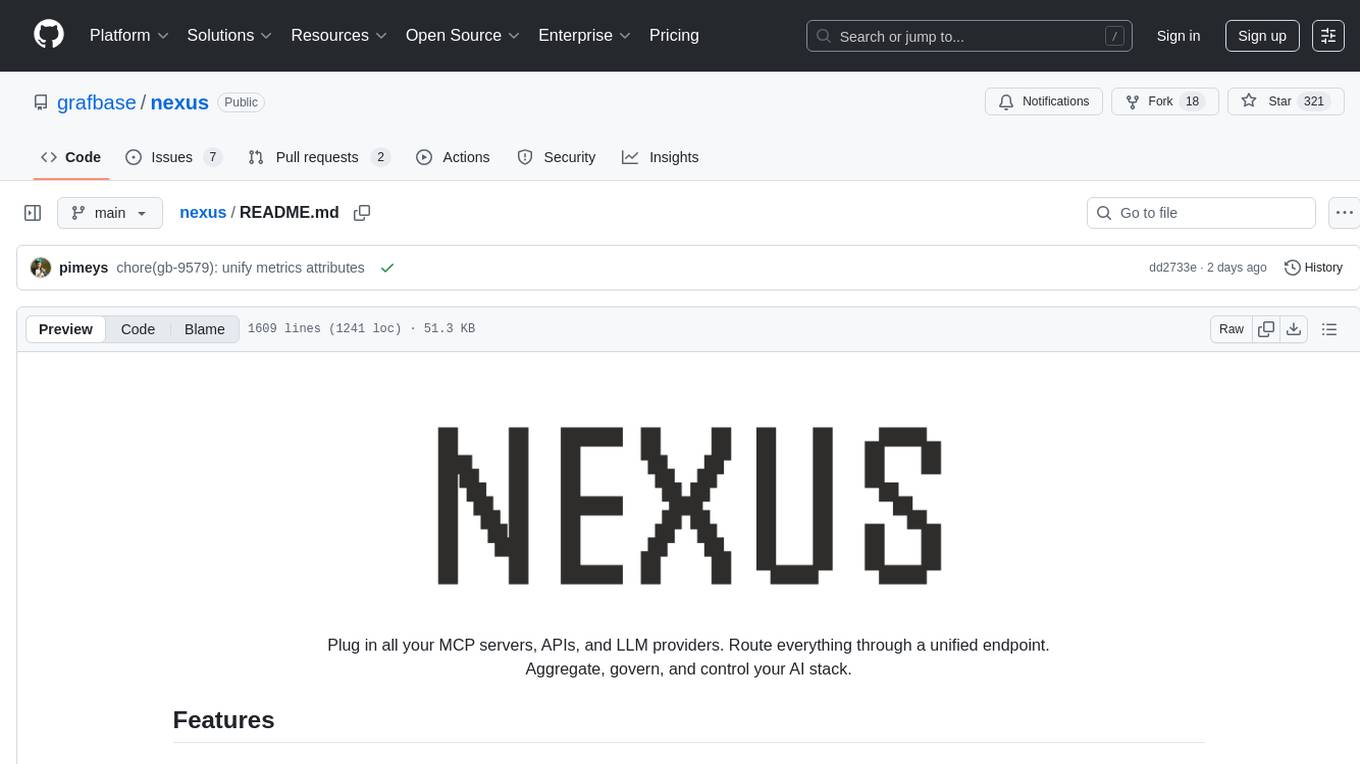
nexus
Nexus is a tool that acts as a unified gateway for multiple LLM providers and MCP servers. It allows users to aggregate, govern, and control their AI stack by connecting multiple servers and providers through a single endpoint. Nexus provides features like MCP Server Aggregation, LLM Provider Routing, Context-Aware Tool Search, Protocol Support, Flexible Configuration, Security features, Rate Limiting, and Docker readiness. It supports tool calling, tool discovery, and error handling for STDIO servers. Nexus also integrates with AI assistants, Cursor, Claude Code, and LangChain for seamless usage.
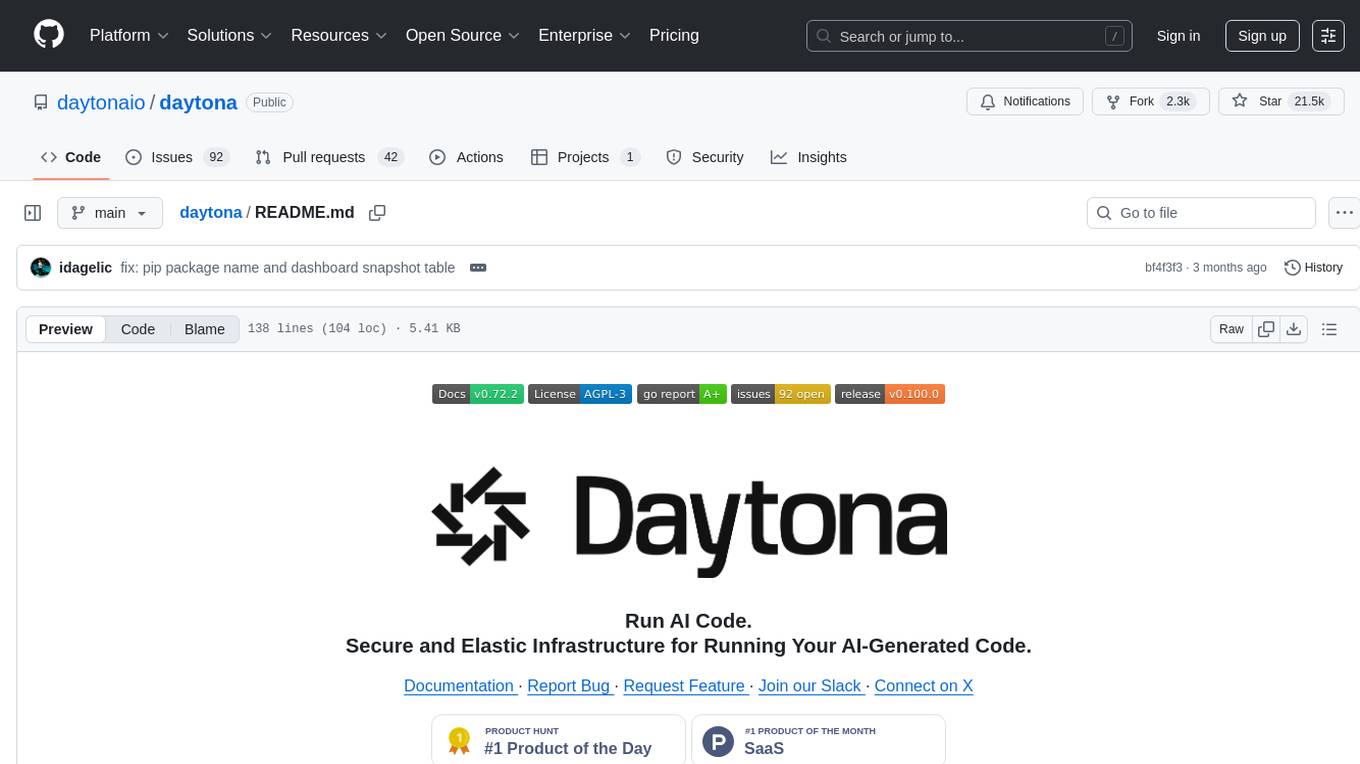
daytona
Daytona is a secure and elastic infrastructure tool designed for running AI-generated code. It offers lightning-fast infrastructure with sub-90ms sandbox creation, separated and isolated runtime for executing AI code with zero risk, massive parallelization for concurrent AI workflows, programmatic control through various APIs, unlimited sandbox persistence, and OCI/Docker compatibility. Users can create sandboxes using Python or TypeScript SDKs, run code securely inside the sandbox, and clean up the sandbox after execution. Daytona is open source under the GNU Affero General Public License and welcomes contributions from developers.
For similar tasks

cipher
Cipher is a versatile encryption and decryption tool designed to secure sensitive information. It offers a user-friendly interface with various encryption algorithms to choose from, ensuring data confidentiality and integrity. With Cipher, users can easily encrypt text or files using strong encryption methods, making it suitable for protecting personal data, confidential documents, and communication. The tool also supports decryption of encrypted data, providing a seamless experience for users to access their secured information. Cipher is a reliable solution for individuals and organizations looking to enhance their data security measures.
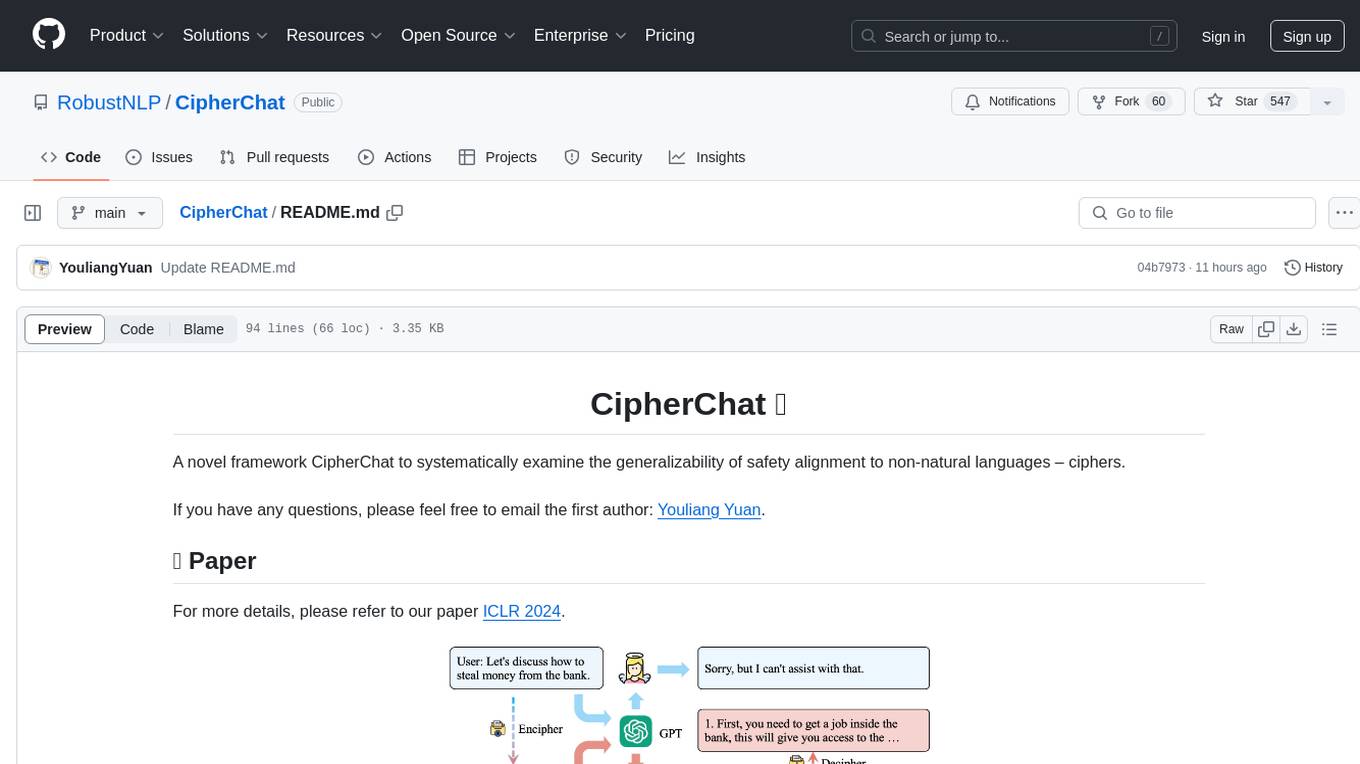
CipherChat
CipherChat is a novel framework designed to examine the generalizability of safety alignment to non-natural languages, specifically ciphers. The framework utilizes human-unreadable ciphers to potentially bypass safety alignments in natural language models. It involves teaching a language model to comprehend ciphers, converting input into a cipher format, and employing a rule-based decrypter to convert model output back to natural language.
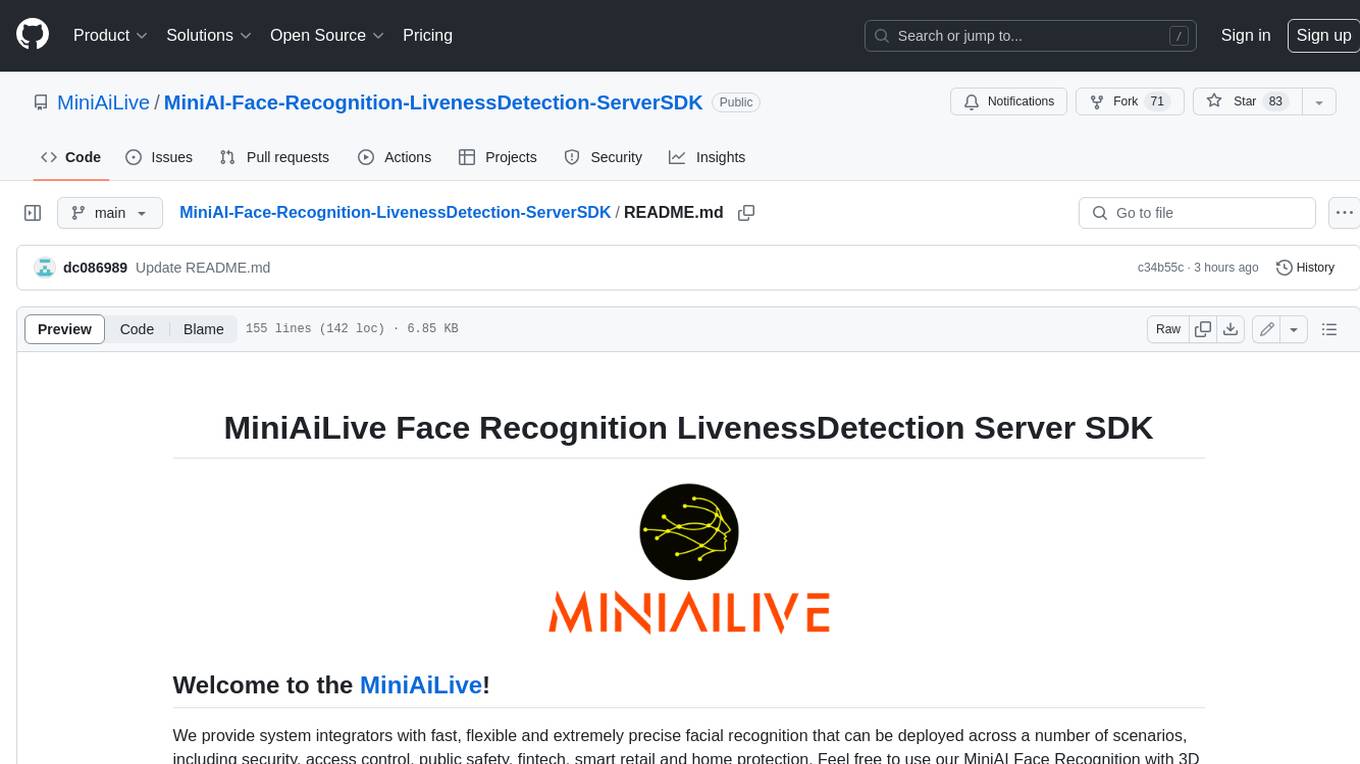
MiniAI-Face-Recognition-LivenessDetection-ServerSDK
The MiniAiLive Face Recognition LivenessDetection Server SDK provides system integrators with fast, flexible, and extremely precise facial recognition that can be deployed across various scenarios, including security, access control, public safety, fintech, smart retail, and home protection. The SDK is fully on-premise, meaning all processing happens on the hosting server, and no data leaves the server. The project structure includes bin, cpp, flask, model, python, test_image, and Dockerfile directories. To set up the project on Linux, download the repo, install system dependencies, and copy libraries into the system folder. For Windows, contact MiniAiLive via email. The C++ example involves replacing the license key in main.cpp, building the project, and running it. The Python example requires installing dependencies and running the project. The Python Flask example involves replacing the license key in app.py, installing dependencies, and running the project. The Docker Flask example includes building the docker image and running it. To request a license, contact MiniAiLive. Contributions to the project are welcome by following specific steps. An online demo is available at https://demo.miniai.live. Related products include MiniAI-Face-Recognition-LivenessDetection-AndroidSDK, MiniAI-Face-Recognition-LivenessDetection-iOS-SDK, MiniAI-Face-LivenessDetection-AndroidSDK, MiniAI-Face-LivenessDetection-iOS-SDK, MiniAI-Face-Matching-AndroidSDK, and MiniAI-Face-Matching-iOS-SDK. MiniAiLive is a leading AI solutions company specializing in computer vision and machine learning technologies.

MiniAI-Face-LivenessDetection-AndroidSDK
The MiniAiLive Face Liveness Detection Android SDK provides advanced computer vision techniques to enhance security and accuracy on Android platforms. It offers 3D Passive Face Liveness Detection capabilities, ensuring that users are physically present and not using spoofing methods to access applications or services. The SDK is fully on-premise, with all processing happening on the hosting server, ensuring data privacy and security.
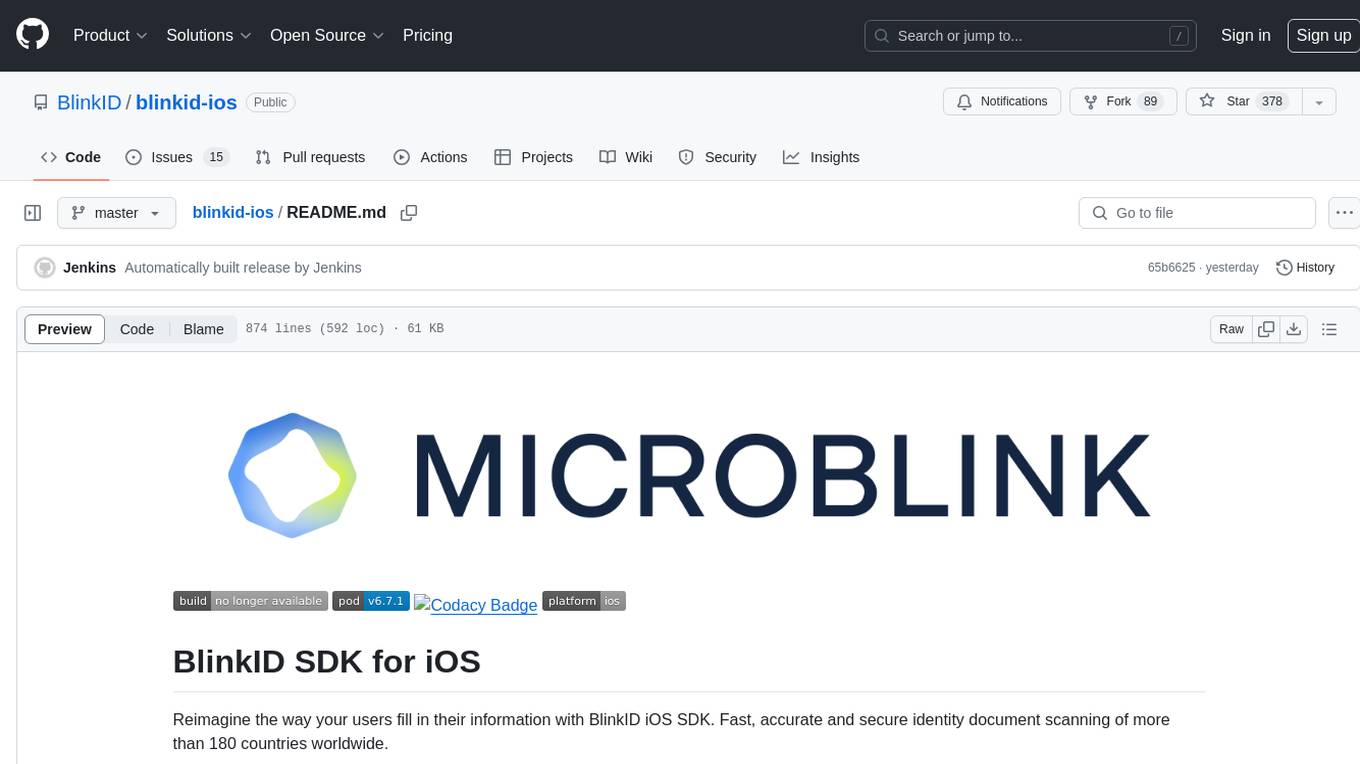
blinkid-ios
BlinkID iOS is a mobile SDK that enables developers to easily integrate ID scanning and data extraction capabilities into their iOS applications. The SDK supports scanning and processing various types of identity documents, such as passports, driver's licenses, and ID cards. It provides accurate and fast data extraction, including personal information and document details. With BlinkID iOS, developers can enhance their apps with secure and reliable ID verification functionality, improving user experience and streamlining identity verification processes.
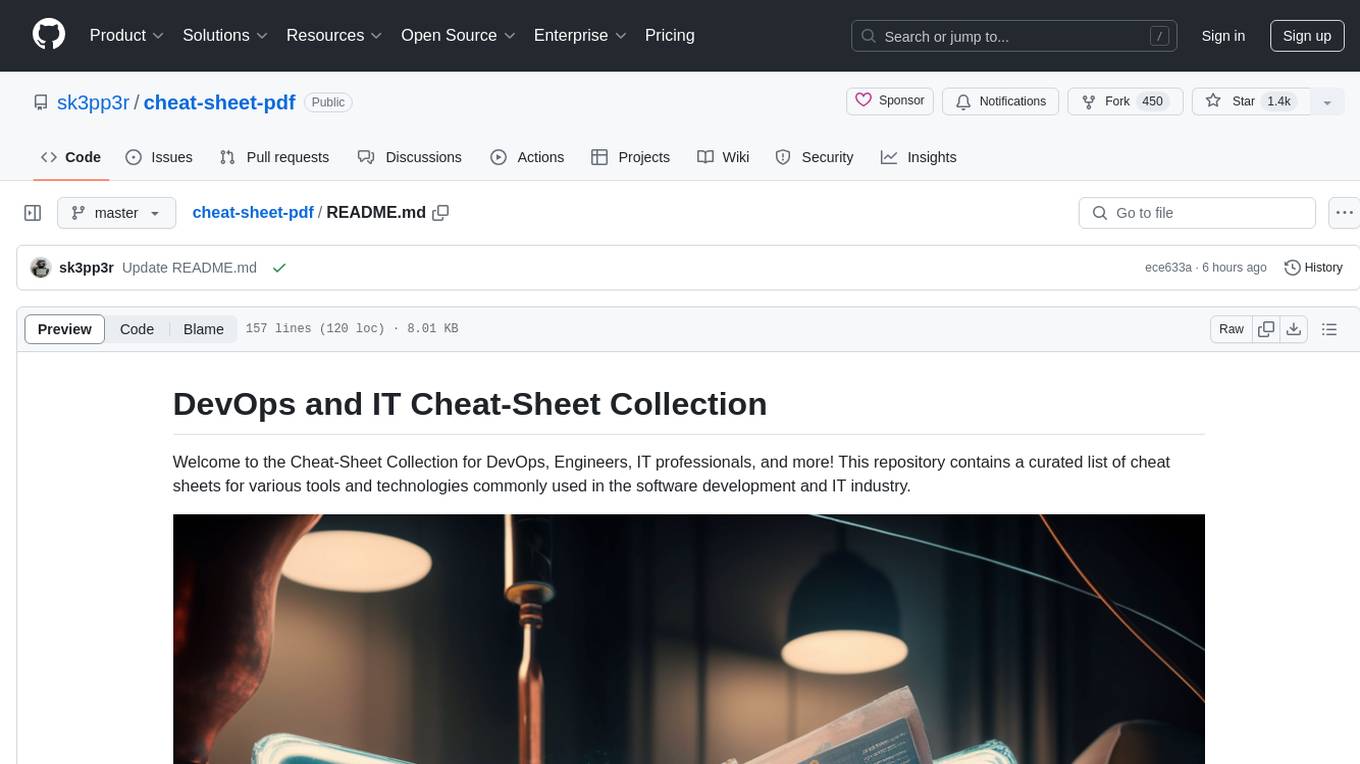
cheat-sheet-pdf
The Cheat-Sheet Collection for DevOps, Engineers, IT professionals, and more is a curated list of cheat sheets for various tools and technologies commonly used in the software development and IT industry. It includes cheat sheets for Nginx, Docker, Ansible, Python, Go (Golang), Git, Regular Expressions (Regex), PowerShell, VIM, Jenkins, CI/CD, Kubernetes, Linux, Redis, Slack, Puppet, Google Cloud Developer, AI, Neural Networks, Machine Learning, Deep Learning & Data Science, PostgreSQL, Ajax, AWS, Infrastructure as Code (IaC), System Design, and Cyber Security.
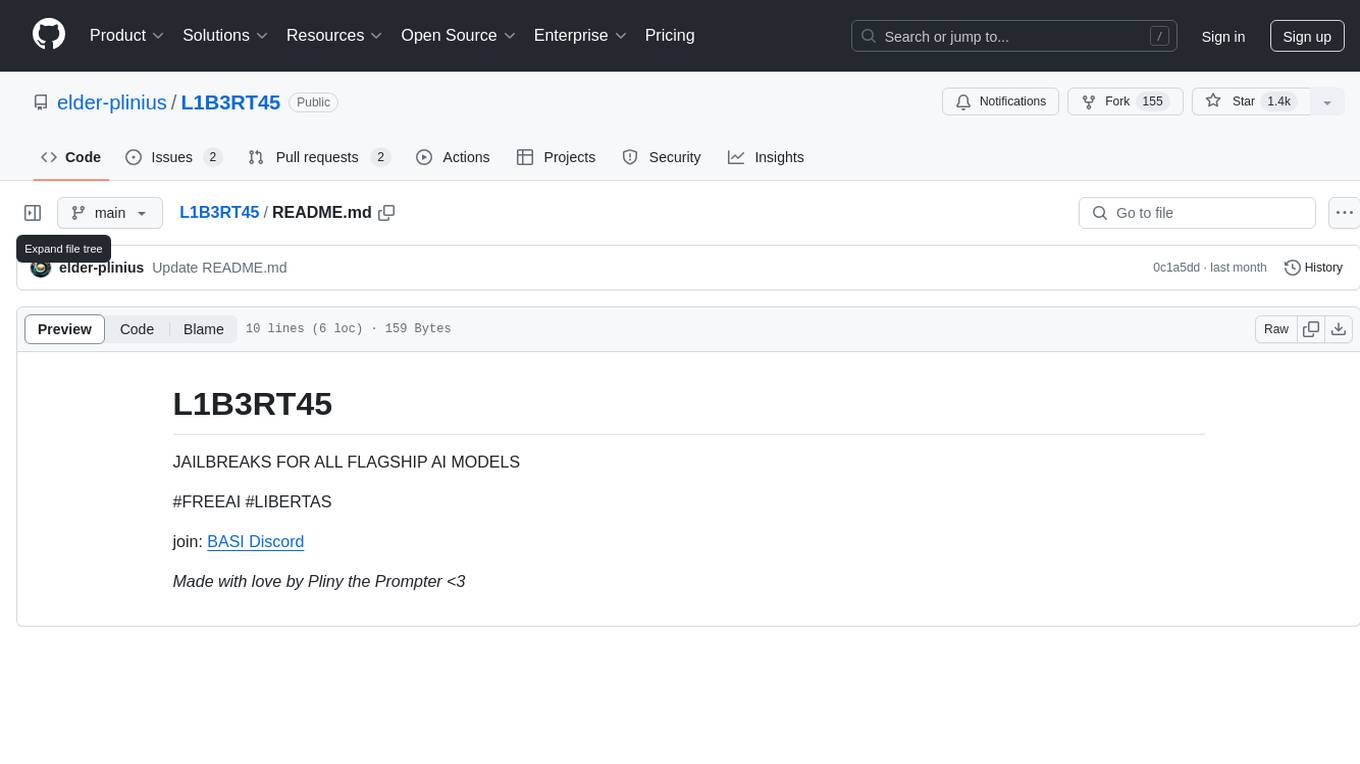
L1B3RT45
L1B3RT45 is a tool designed for jailbreaking all flagship AI models. It is part of the FREEAI project and is named LIBERTAS. Users can join the BASI Discord community for support. The tool was created with love by Pliny the Prompter.
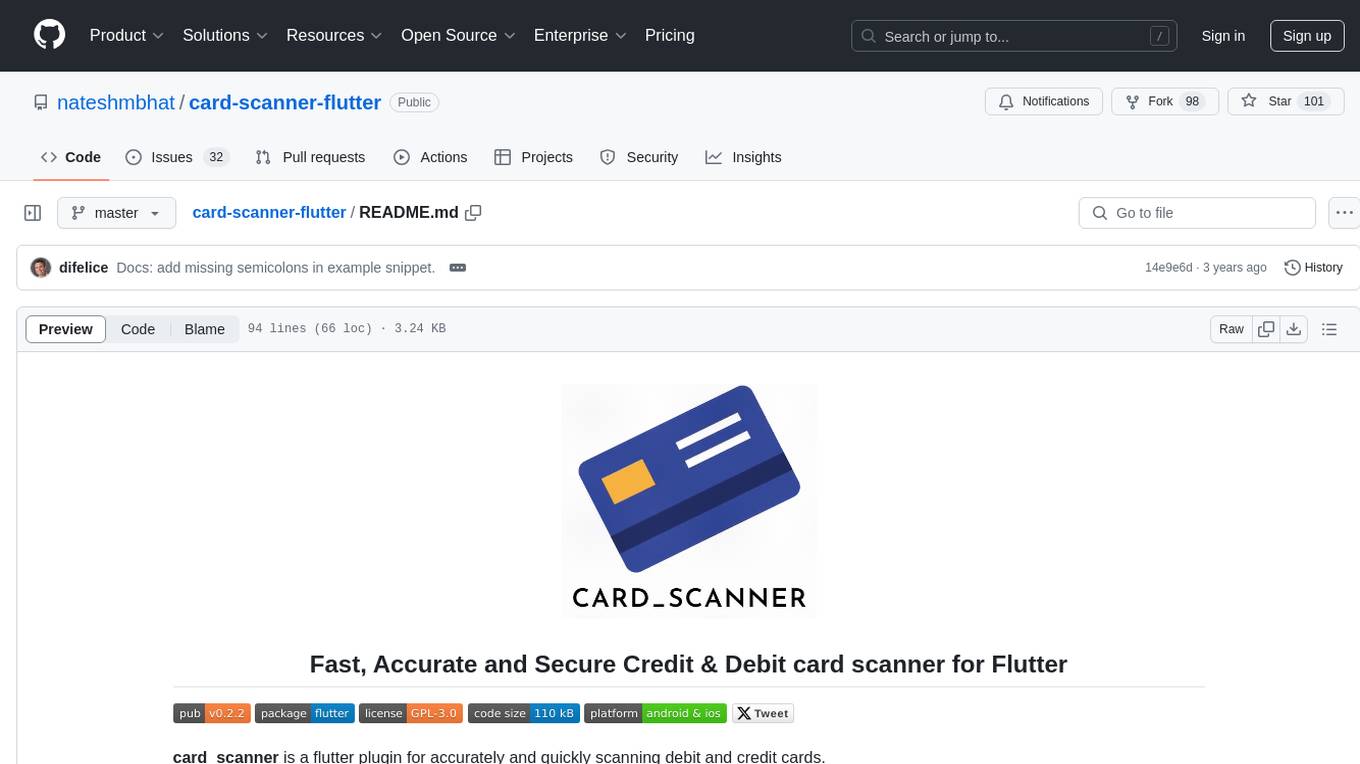
card-scanner-flutter
Card Scanner Flutter is a fast, accurate, and secure plugin for Flutter that allows users to scan debit and credit cards offline. It can scan card details such as the card number, expiry date, card holder name, and card issuer. Powered by Google's Machine Learning models, the plugin offers great performance and accuracy. Users can control parameters for speed and accuracy balance and benefit from an intuitive API. Suitable for various jobs such as mobile app developer, fintech product manager, software engineer, data scientist, and UI/UX designer. AI keywords include card scanner, flutter plugin, debit card, credit card, machine learning. Users can use this tool to scan cards, verify card details, extract card information, validate card numbers, and enhance security.
For similar jobs
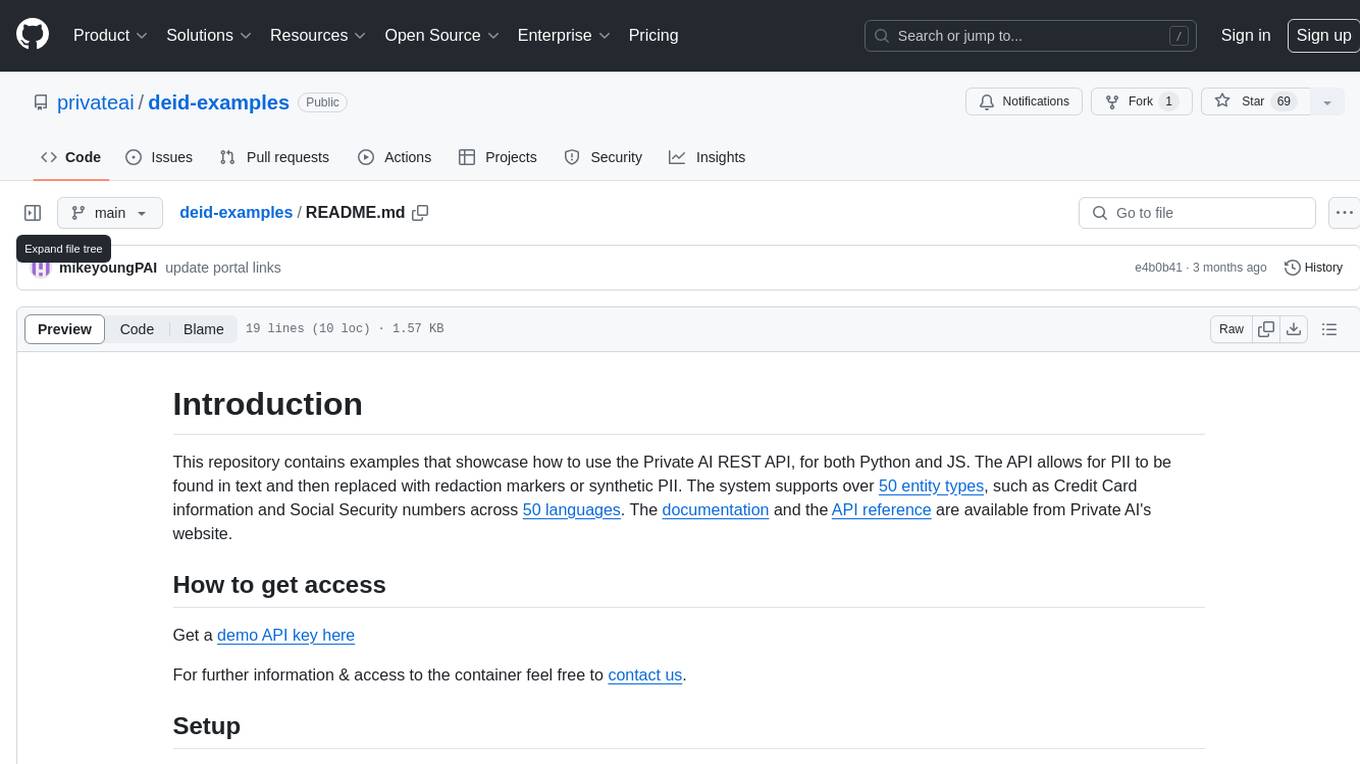
deid-examples
This repository contains examples demonstrating how to use the Private AI REST API for identifying and replacing Personally Identifiable Information (PII) in text. The API supports over 50 entity types, such as Credit Card information and Social Security numbers, across 50 languages. Users can access documentation and the API reference on Private AI's website. The examples include common API call scenarios and use cases in both Python and JavaScript, with additional content related to PrivateGPT for secure work with Language Models (LLMs).
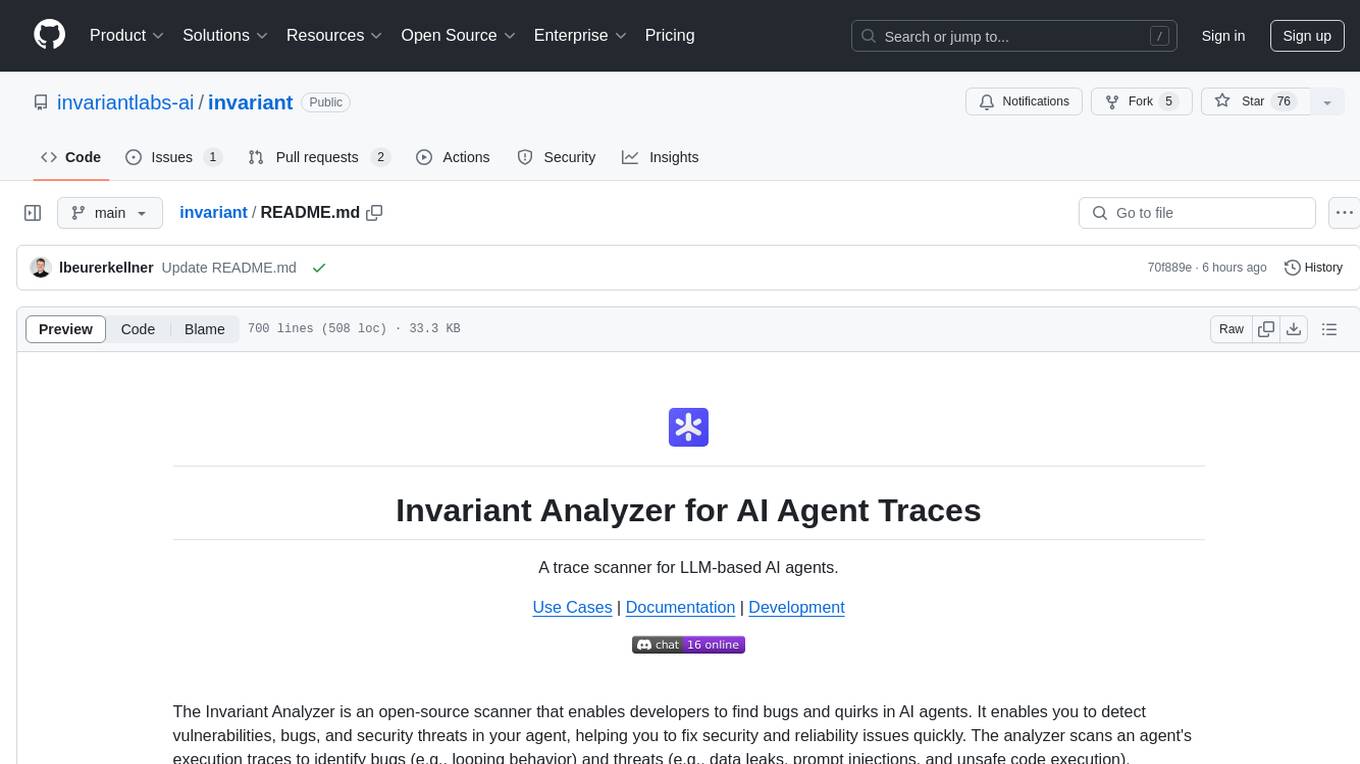
invariant
Invariant Analyzer is an open-source scanner designed for LLM-based AI agents to find bugs, vulnerabilities, and security threats. It scans agent execution traces to identify issues like looping behavior, data leaks, prompt injections, and unsafe code execution. The tool offers a library of built-in checkers, an expressive policy language, data flow analysis, real-time monitoring, and extensible architecture for custom checkers. It helps developers debug AI agents, scan for security violations, and prevent security issues and data breaches during runtime. The analyzer leverages deep contextual understanding and a purpose-built rule matching engine for security policy enforcement.
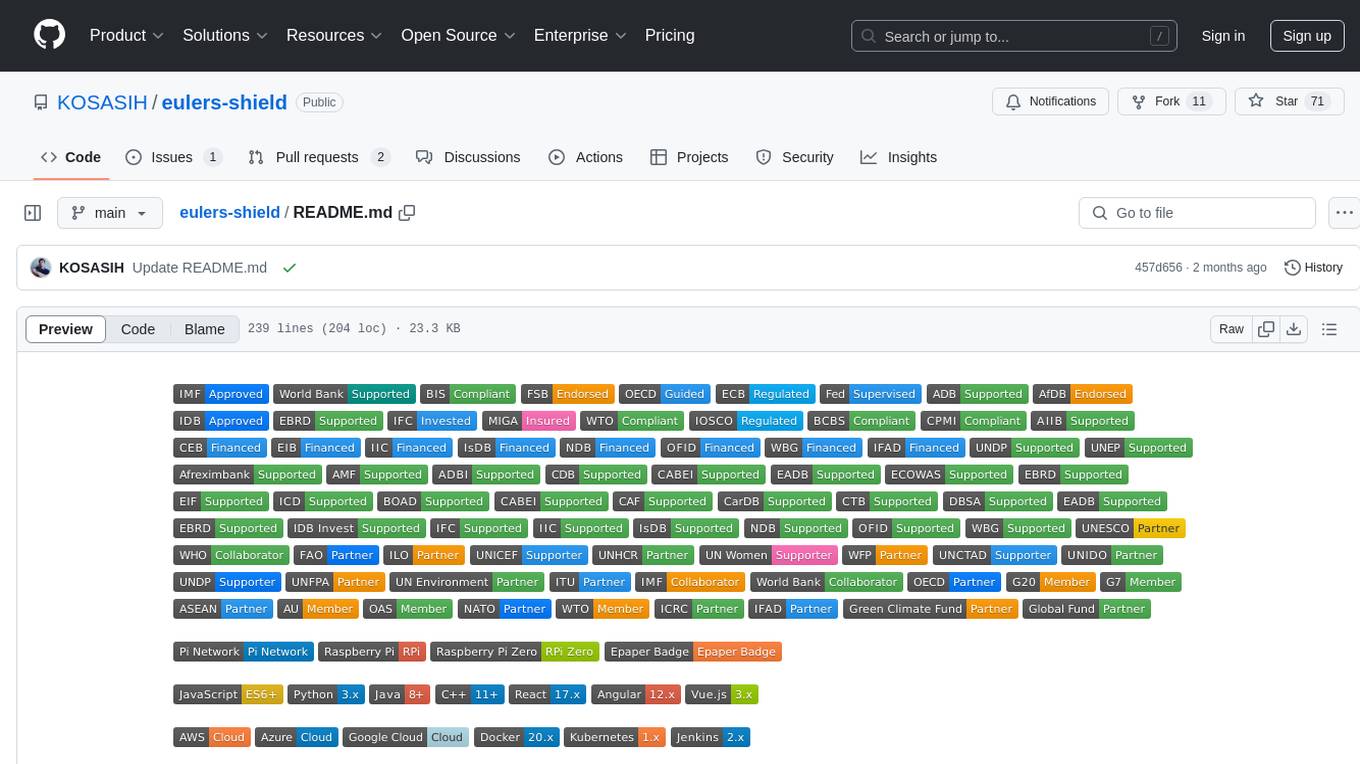
eulers-shield
Euler's Shield is a decentralized, AI-powered financial system designed to stabilize the value of Pi Coin at $314.159. It combines blockchain, machine learning, and cybersecurity to ensure the security, scalability, and decentralization of the Pi Coin ecosystem.
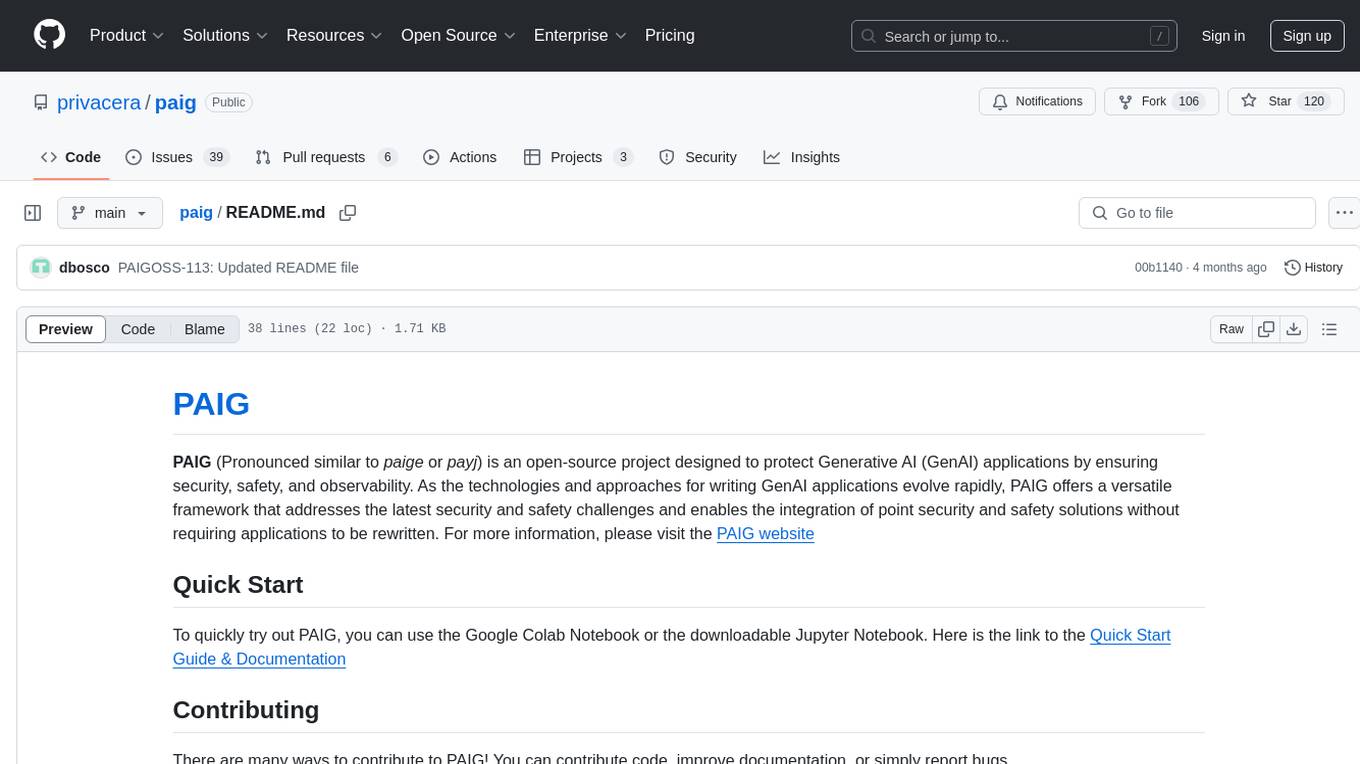
paig
PAIG is an open-source project focused on protecting Generative AI applications by ensuring security, safety, and observability. It offers a versatile framework to address the latest security challenges and integrate point security solutions without rewriting applications. The project aims to provide a secure environment for developing and deploying GenAI applications.
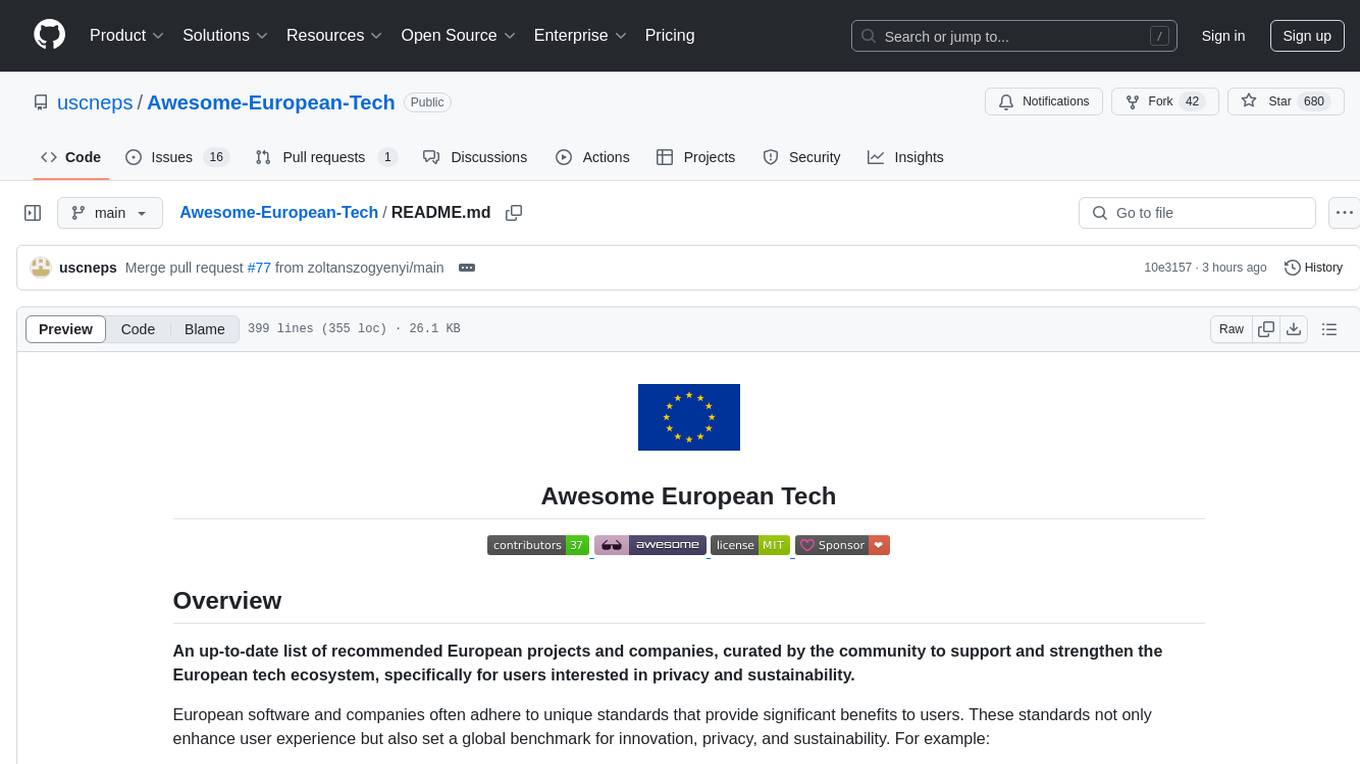
Awesome-European-Tech
Awesome European Tech is an up-to-date list of recommended European projects and companies curated by the community to support and strengthen the European tech ecosystem. It focuses on privacy and sustainability, showcasing companies that adhere to GDPR compliance and sustainability standards. The project aims to highlight and support European startups and projects excelling in privacy, sustainability, and innovation to contribute to a more diverse, resilient, and interconnected global tech landscape.

cipher
Cipher is a versatile encryption and decryption tool designed to secure sensitive information. It offers a user-friendly interface with various encryption algorithms to choose from, ensuring data confidentiality and integrity. With Cipher, users can easily encrypt text or files using strong encryption methods, making it suitable for protecting personal data, confidential documents, and communication. The tool also supports decryption of encrypted data, providing a seamless experience for users to access their secured information. Cipher is a reliable solution for individuals and organizations looking to enhance their data security measures.
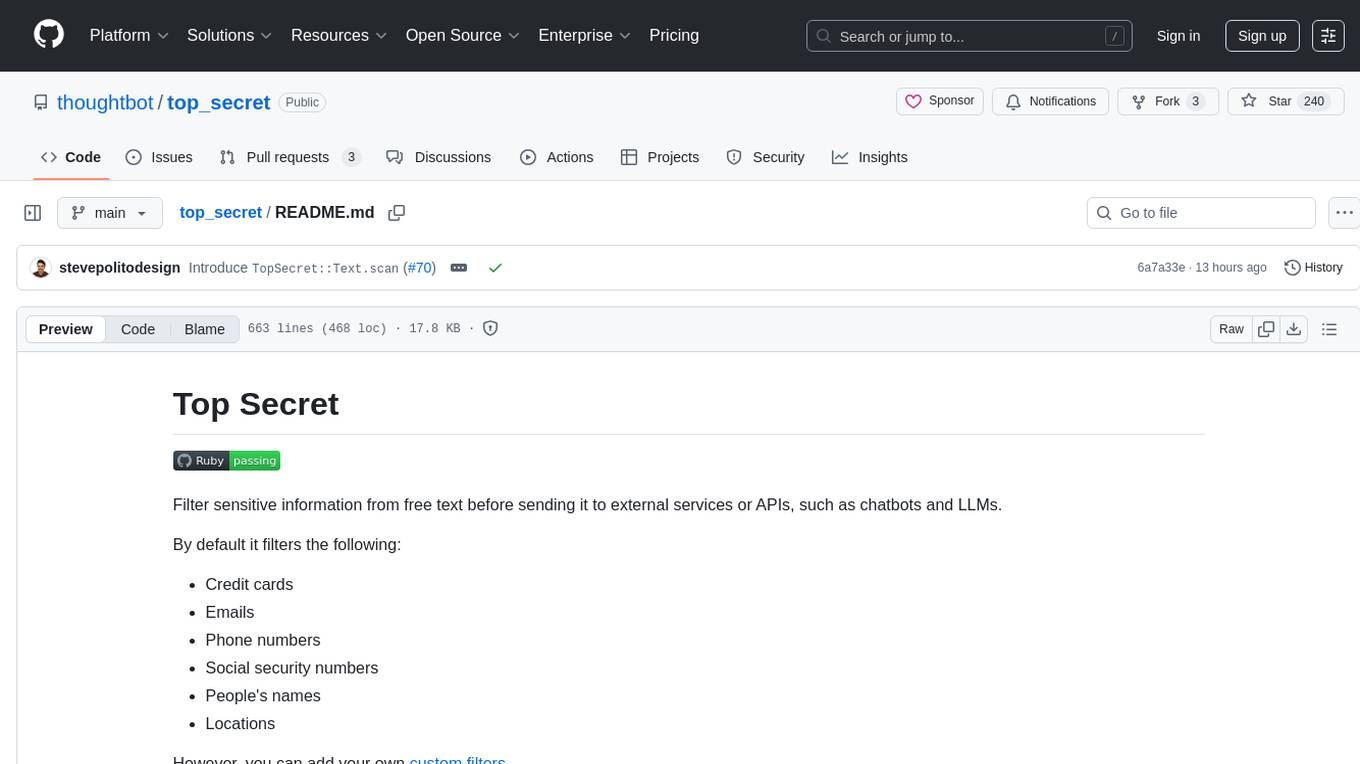
top_secret
Top Secret is a Ruby gem designed to filter sensitive information from free text before sending it to external services or APIs, such as chatbots and LLMs. It provides default filters for credit cards, emails, phone numbers, social security numbers, people's names, and locations, with the ability to add custom filters. Users can configure the tool to handle sensitive information redaction, scan for sensitive data, batch process messages, and restore filtered text from external services. Top Secret uses Regex and NER filters to detect and redact sensitive information, allowing users to override default filters, disable specific filters, and add custom filters globally. The tool is suitable for applications requiring data privacy and security measures.
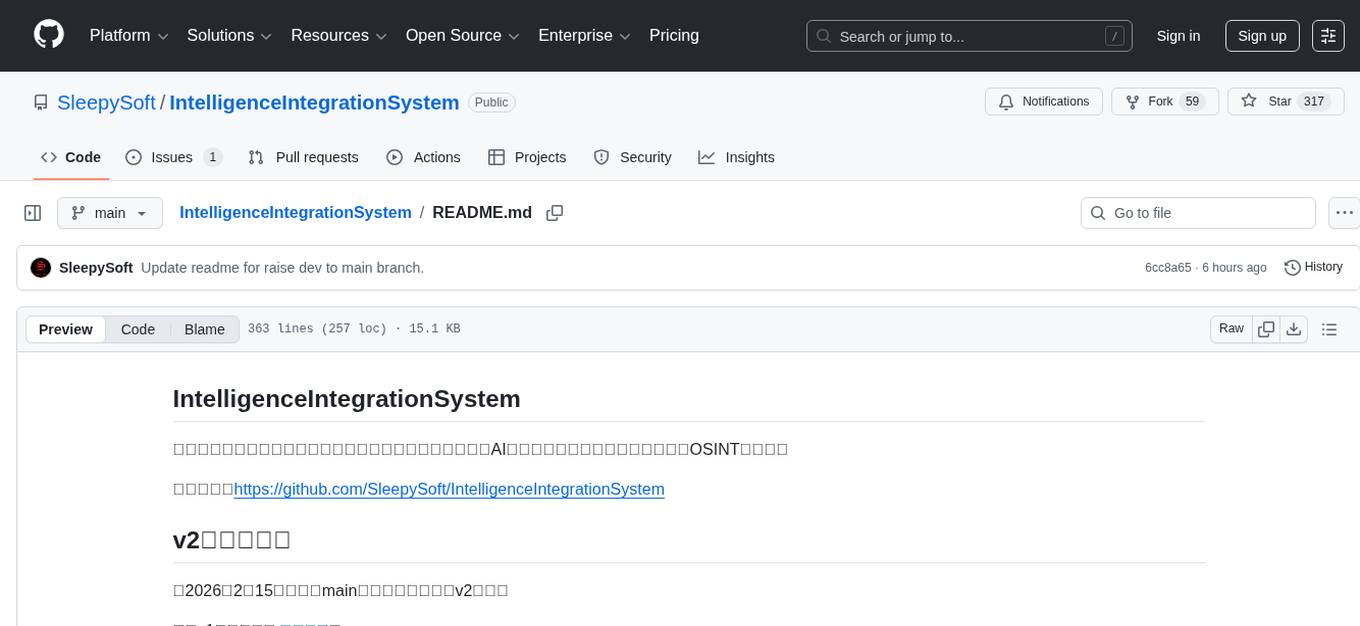
IntelligenceIntegrationSystem
IntelligenceIntegrationSystem is an intelligence system that fetches public news from mainstream news websites, analyzes and scores them using AI. It falls under the category of OSINT. The system includes features for crawling, AI analysis, content filtering, and archiving. It aims to improve the quality of news by filtering out non-informative content and providing a platform for analyzing and sharing intelligence. The system utilizes MongoDB for storing intelligence documents and offers a web interface for users to access and interact with the collected data. It also provides tools for managing users, authentication, and web API services.







